Fields of Resistance
Professor LaShandra Sullivan investigates land rights movements and inspires a new generation of thinkers.
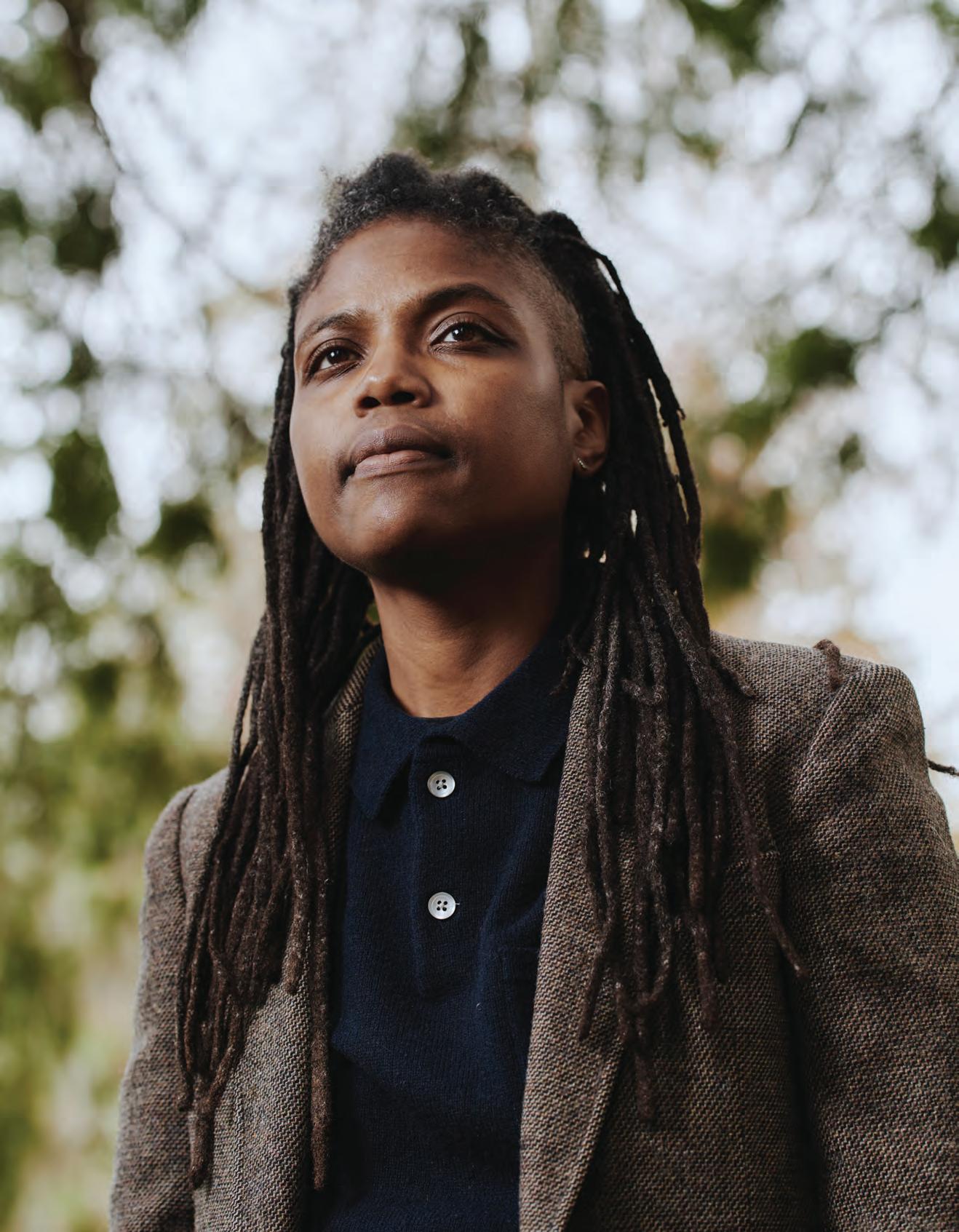
MARCH 2023
‰
Open doors for Reedies with a gift to financial aid. The college meets 100% of demonstrated need for a full four years, supporting more than half the student body.
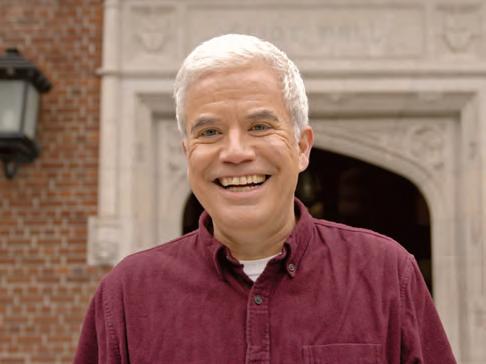
With the help of donors like YOU , Reedies bring their unique gifts to the conference table, the art studio, and the residence hall. When members of our community open doors for each other, the Reed experience becomes the vibrant exchange of ideas it is truly meant to be.
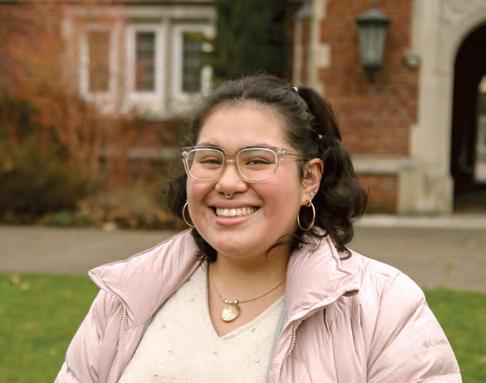
WELCOME IN REED
“ My financial aid package meant that someone, somewhere, wanted me to have a chance to succeed at Reed.”
DYLAN RIVERA ’95 , Alumni Donor
“ Financial aid allows me to pursue my passions, like making art and taking the history classes from Jackie Dirks that have influenced my career at Reed.”
M.J. QUINTANA-RODRIGUEZ ’24
GIVING.REED.EDU
14 Through the Portal
Josh Riedel ’07 was Instagram’s first employee. His debut novel plunges readers into startup life.
 BY REBECCA JACOBSON
BY REBECCA JACOBSON
16 Fields of Resistance
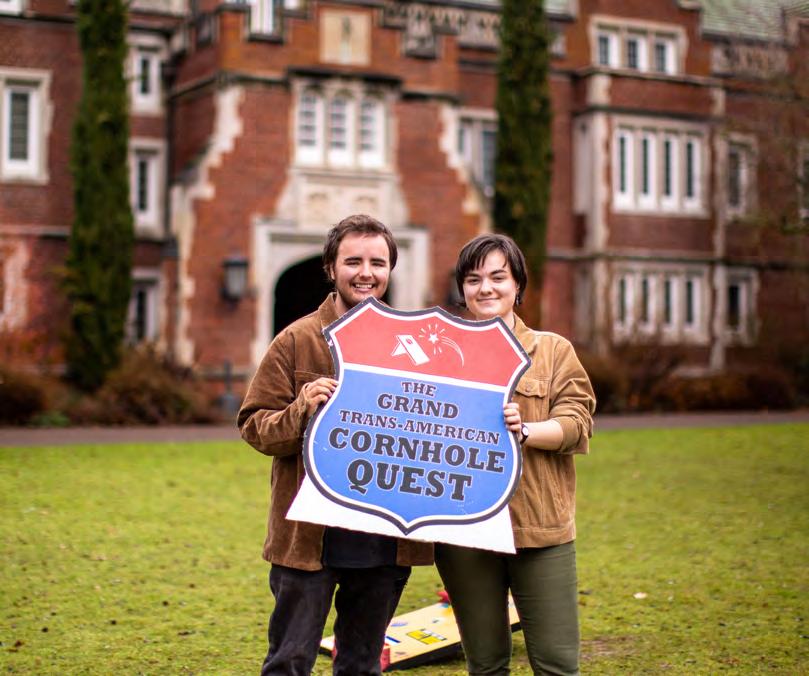 BY ROMEL HERNANDEZ
BY ROMEL HERNANDEZ
Alan Shusterman [chemistry] William Diebold [art history] Minh Tran [dance]
FEATURES
Professor LaShandra Sullivan investigates land rights movements and inspires a new generation of thinkers.
DEPARTMENTS
Time Goes By
Mailbox
Circular NEWS FROM C AMPUS
We Learned at Paideia
Digs into American
Faculty Honors
2 As
3
4 Eliot
10 Fascinating Things
2023 A Cross-Country Cornhole Trip
Identity
ALL THINGS AL UMNI Your New Alumni Relations Call for Archival Material Get Involved
8 Advocates of the Griffin
10 Retiring Professors Gail Sherman [English and humanities]
Class Notes NEWS FROM OUR CLA SSMATES 32 In Memoriam HONORING CLA SSMATES, PROFESSORS, AND FRIENDS WHO HAVE DIED Devoted to Maintaining Reed’s Excellence: Stephen R. McCarthy ’66 44 Object of Study WHA T REED STUDENTS ARE LOOKING AT IN CLASS Photographing the Zenana: Gender and Representation 14 6
20 Reediana BOOKS, FILM, AND MUSIC B Y REEDIES Toad by Katherine Dunn ’69 24
’24
PHOTO BY MARK DAVIS
PHOTO CORNELIA SOMA PENN
Cover photo by Clayton Cotterell
As Time Goes By
Over the past months, I have noticed how challenging it can be to remember dates and sequences of events in the wake of the disruptions brought about by the pandemic. Cheryl and I will be reminiscing about dinner with friends or a concert and when we try to pinpoint when it happened, we simply cannot get it right. We run searches in our calendars and look through emails , hoping to reconstruct the storyline of our lives. We know we’re not alone.
These struggles with memory remind me of a writing exercise the cartoonist Lynda Barry recommends. Barry notes that when most people write about their lives, especially as we get older, we tend to generalize and sentimentalize. Our memories can be somewhat flat. To excavate and bring our histories to life, she suggests that we make lists. For example, make a list of your favorite pairs of sneakers, car trips, libraries—whatever you think might open up a portal to your past. She notes that the first items that come to mind are usually not the most resonant ones, and so, she invites us to take note of when the items start to feel particularly vivid and then pick one of those vibrant ones to write about, focussing on it and writing it back into being.
Give it a try, perhaps in relation to Reed. You could make a list of the best places you discovered on campus for contemplation or classrooms where you were inspired. Many of the stories in this issue are likely to spark recollections—and there’s even a list that might lead you to make your own (memorable Paideia classes, anyone?).
www.reed.edu/reed-magazine
3203 SE Woodstock Boulevard, Portland, Oregon 97202 503-777-7591
Volume 102, No.1
REED MAGAZINE EDITOR
Katie Pelletier ’03 503-777-7727 pelletic@reed.edu
WRITER / IN MEMORIAM EDITOR
Randall S. Barton 503-517-5544 bartonr@reed.edu
WRITER/EDITOR Rebecca Jacobson 503-517-7735 rjacobson@reed.edu
ART DIRECTOR Tom Humphrey tom.humphrey@reed.edu
CLASS NOTES EDITOR
Joanne Hossack ’82 joanne@reed.edu
REEDIANA EDITOR
Robin Tovey ’97 reed.magazine@reed.edu
GRAMMATICAL KAPELLMEISTER
Virginia O. Hancock ’62
REED COLLEGE RELATIONS
VICE PRESIDENT, COLLEGE RELATIONS AND PLANNING
Hugh Porter
DIRECTOR, COMMUNICATIONS & PUBLIC AFFAIRS
Sheena McFarland
Reed College is an institution of higher education in the liberal arts and sciences devoted to the intrinsic value of intellectual pursuit and governed by the highest standards of scholarly practice, critical thought, and creativity.

My Reed list, so far, looks like this: the blue bridge lit up at night, a seasoned weathergram rustling in the breeze, cherry blossoms viewed from east-facing windows in Eliot Hall, calligraphed letters from Reedie alums, plastic laurels on the caps of graduating seniors. Cherished flashes of memory, the kind that endure.
Bilger President of Reed
Reed Magazine provides news of interest to the Reed community. Views expressed in the magazine belong to their authors and do not necessarily represent officers, trustees, faculty, alumni, students, administrators, or anyone else at Reed, all of whom are eminently capable of articulating their own beliefs.
Reed Magazine (ISSN 0895-8564) is published quarterly by the Office of Public Affairs at Reed College. Periodicals postage paid at Portland, Oregon.
Postmaster: Send address changes to Reed Magazine 3203 SE Woodstock Blvd, Portland OR 97202-8138
MARCH 2023 ‰
This Must Be the Place
During their Talking Tunes Paideia class in January, Cheryl and Audrey shared favorite musical memories.
Audrey
You could make a list of the best places you discovered on campus for contemplation or classrooms where you were inspired.
2 Reed Magazine MARCH 2023
LAUREN LABARRE
WRITE TO US! We love getting mail from readers. Letters should be about Reed (and its alumni) or Reed Magazine (and its contents) and run no more than 300 words; subsequent replies may run only half the length of their predecessors. Our decision to print a letter does not imply any endorsement. Letters are subject to editing. (Beware the editor’s hatchet.) For contact information, look to your left.
Driving the Magic School Bus
It is worth noting that Michael Templeton ’63 [In Memoriam, December 2022] and Frances (Brown) Nankin ’71, both Reedies, spearheaded the science and math content for the awardwinning PBS Kids shows The Magic School Bus and Cyberchase Reed can take some credit for the shows’ unique and innovative approaches to basic elementary curriculum. Michael and I worked together for nearly 20 years, and I miss the gratifying (and sometimes contentious) problem-solving!
Frances Nankin ’71 Brunswick, Maine

Intellectual Ambience
I was an assistant professor of history at Reed from 1958–62. Taking a leave of absence in 1962, I spent the next four years in Florence, Italy, doing research, and passed on to UCLA as a full professor in 1966. It goes without saying that I knew Prof. Marvin Levich [philosophy 1953–94] well [In Memoriam, June 2022]. I loved my teaching at Reed, the small classes, the intimacy, and the sharp intellectual ambience. Never again, at UCLA, was my teaching to be so stimulating, rewarding, and committed. Large classes are in some respects the impersonal enemy of education.
My wife, distinguished Irish novelist Julia O’Faolain, also taught at Reed. She taught French from 1958 to 1962. She passed away in October, 2020.
Professor Lauro Martines [history 1958–62] London, England
That’s Olde Hat. bookstore.reed.edu Pick up a replacement at the Reed bookstore this spring! That’s Olde Hat. bookstore.reed.edu Pick up a replacement at the Reed bookstore this spring!
Mailbox
Eliot Circular
10 Fascinating Things We Learned at Paideia 2023

Fencing. Birds of eastern Australia. Lock bypassing. Heuristic horticulture. Mushroom identification. Burlesque. Beekeeping. The neurobiology of trauma. Argentine tango. Argentine slang. The geology of Reed. Knot tying. How to clean your dishes.
That’s just a small sampling of what was on offer at this year’s Paideia, Reed’s annual festival of learning. For 10 days, members of the Reed community led and took part in classes covering the full (extra)curricular gamut, continuing a tradition that began in
1969. The Reed Magazine team was along for the ride. Here’s a peek into what we learned.
1. To avoid damaging a fountain pen, always untwist the lid before pulling, and never put the cap on the back when writing.
2. When American Protestant missionaries arrived in Hawaii in the 1820s, they denounced hula as pagan and vulgar. The next several decades brought numerous attempts to ban, regulate, or discourage the dance— none of which could actually keep hula down.
3. A terrarium’s closed, self-sustaining
FROM CAMPUS
NEWS
4
ecosystem can be enriched by the addition of a small colony of springtails. These landbound arthropods feast on organic materials and can leap to great heights relative to their body size—but not high enough to escape the terrarium’s mossy paradise.
4. The internet was developed in the context of the Cold War, and early research was mostly funded by the Department of Defense.
5. The Sallyport of Old Dorm Block is a virtual copy of the gate at Compton Wynyates, a Tudor-era manor dedicated to Henry VIII.
6. Being gay was decriminalized in 1791 in Paris in the wake of the French Revolution.
7. Letterboxing, an orienteering game involving stamp trading, started in England in 1854 when a Dartmoor National Park guide, James Perrott, left a card in a bottle by Cranmere Pool and invited others to leave their own messages as well.
8. Don’t expect meditation to permanently quiet the mind. Andrew Mason ’90 says his teacher was once asked what his mind was like after 60 years of Zen meditation
practice. “It’s a mess,” he said. “But you should have seen it before.”
9. Always listen to the whole tape. After rescuing a collection of cassettes from songwriter Robbie Robertson’s storage unit, producer Cheryl Pawelski, wife of Reed President Audrey Bilger, discovered a raw and powerful vocal-and-piano version of the song “Twilight” at the end of an otherwise blank side of a tape.
10. On the last day of the old commons in 1965, students staged a mass food fight that resulted in 233 honor violations.
 PHOTO BY LAUREN LABARRE
PHOTO BY LAUREN LABARRE
5
In a Paideia workshop on Chinese calligraphy, course instructor Tony Shan ‘23 (second from right) gives tips as Reedies create calligraphic ornaments to welcome the Year of the Rabbit.
A Cross-Country Cornhole Trip Digs into American Identity
The Grand Trans-American Cornhole Quest began as a bucket list dream. It was 2017 and Emilie Kelly ’25, then a high school sophomore, was attempting to make sense of the prevailing national narrative of America as hopelessly divided. It was a terrifying notion, she says, but more than that, she found herself questioning its accuracy.

“The majority of the information I was getting about walks of life other than my own was coming from secondhand sources,” says Emilie, who grew up outside New York City in suburban Westchester County. “I was like, it can’t be like what I’m hearing from the news.”
Emilie imagined traveling the country, meeting strangers, and engaging them in conversation about what it means to be an American—all while playing a classic lawn game. Last summer, with support from the President’s Summer Fellowship (sponsored by Dan Greenberg ’62 and Susan Steinhauser), that vision became reality in the form of a seven-week-long voyage that spanned 32 states, 15,000 miles, and 106 (completed) rounds of cornhole. With a borrowed camcorder and friends-turned-film
crew—including Lane Devers ’25 and Joseph Tally ’25—Emilie collected more than 24 hours of footage, which last semester she cut into a thoughtful 85-minute documentary available on YouTube.
Goofy? That was kind of the point. Emilie, an anthropology major, had always wanted a game to be part of the project, and she suspected cornhole would disarm strangers and help break the ice. Her instinct was shored up while in class with Prof. Paul Silverstein [anthropology], who introduced her to the work of Charles Briggs, an anthropologist who has encouraged researchers to consider the “local metacommunicative repertoire”— in other words, to pay attention to which social situations are appropriate for interviewing. Not only would flinging bean bags give people’s hands something to do, playing a familiar game would set them at ease as they answered questions about community, home, and identity.
Over the course of the interviews—152 of them, with 215 people—themes emerged. Many people felt proud or privileged to be an American. But just as many felt shame or
embarrassment, didn’t feel like an American, or found the question too knotted in paradox to answer. Emilie says she got along with everyone she met, but at times still felt like she “was doing foreign exchange.” How could she square such disparate perspectives? Late in the journey, driving through the Southwest and “listening to NPR and TED Talks and trying to understand the entirety of American history,” she found herself exhausted and overwhelmed by the enormity of the challenge.
And then beauty intervened. Emilie pulled into Arches National Park as the sun was sinking. Rain had just rinsed the sky clean, and a double rainbow formed over the desert landscape. Maybe, Emilie thought, there is no reconciling of the contradictions of American identity, and maybe that’s OK. “I came away with this sort of poetic take on it, where the shadow is only as dark as the light that shines on it,” Emilie says. “We have to hold juxtaposing, contrasting things. We have to respect both of them, and we have to keep them both with us.”
—REBECCA JACOBSON
Eliot Circular
PHOTO BY CORNELIA SOMA PENN ’24
6 Reed Magazine MARCH 2023
Anthropology major Emilie Kelly ’25 logged 15,000 miles and 106 games of cornhole on her seven-week journey across 32 states.
FACULTY HONORS
Congrats to two Reed professors who received notable awards in late 2022.
Mark Burford, R.P. Wollenberg Professor of Music, was awarded the Royal Musical Association’s Dent Medal for 2022 for his outstanding contribution to musicology. Burford, who’s been at Reed since 2007, began his career with a focus on Brahms and Austro-German concert music of the late 18th and early 19th centuries, but in the last 10 years has turned his attention to Black popular music studies, from Sam Cooke to Mahalia Jackson.

The Dent Medal committee noted that Burford “has opened up a new field, offering Black objects of study as a legitimate and productive focus for musicological enquiry.”
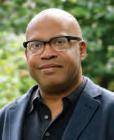
Meanwhile, Kelly Chacón , Arthur F. Scott Associate Professor of Chemistry, was named a Henry Dreyfus Teacher-Scholar.The award, given by the Camille & Henry Dreyfus Foundation and based on institutional nominations, “honors young faculty in the chemical sciences who have created an outstanding independent body of scholarship and are deeply committed to education with undergraduates.” Each Teacher-Scholar receives an unrestricted research grant of $75,000.
Chacón, who arrived at Reed in 2015, has been a fast-rising figure in the chemical sciences. They plan to use much of the grant to fund travel for themself as well as for their students to conferences both domestically and internationally. The grant will also help cover costs for students to travel to the Stanford Synchrotron Radiation Lightsource, where they will do X-ray absorption spectroscopy with Chacón.
“My work in technology is professionally rewarding but also intellectually one-dimensional. I was hungry for deeper engagement with the broader world of ideas and a guiding structure within which to do so. Participating in the MALS program has given me the opportunity to engage in the free exchange of ideas in a supportive, structured community of like-minded individuals. In my time at Reed I have experienced personal growth and significant scholarly development, and this is due in no small part to the academic excellence and attentiveness of the teaching staff, the dynamic dialectic of the class conference, and the diversity of coursework.”
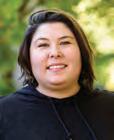
Learn more at reed.edu/MALS
REED COLLEGE MASTER OF ARTS IN LIBERAL STUDIES
—DEREK FINN MALS ’21 PHOTOS BY NINA JOHNSON ’99
Advocates of the Griffin
News of the Alumni Association • Connecting Reed Alumni Around the Globe
EDITED BY AURORE GIGUET | DIRECTOR OF ALUMNI RELATIONS & VOLUNTEER ENGAGEMENT
Your New Alumni Relations
BY AURORE GIGUET
Reed’s Alumni Programs & Annual Fund is changing. Last year, we divided into two departments: Advancement Communications and Alumni Relations & Volunteer Engagement.
In partnership with colleagues across campus, the advancement communications team engages the broader Reed community through meaningful, inspirational, impactful, and relevant communications in support of the college’s mission.

The alumni relations team provides resources, programs, and events that foster lifelong relationships and partnership with the global Reed community. How we work with our community has changed, too. We believe that alumni serve as bridges between students and the college, between recent graduates and careers, between the world and the college, and between each other. Ours is a lifelong community united by a shared curiosity and commitment to exploring fundamental questions.
Over the coming months and years, we will continue to evaluate how we can best help keep alumni connected to Reed and to each other while inspiring action on behalf of the college. As we seek ways to meet the needs of our alumni, we ask your help in meeting the needs of current and future students through advocacy, philanthropy, and volunteerism.
please consider getting involved to support fellow Reedies.
Rachel Armitage
ALUMNI SUPPORT OF THE COLLEGE, REGARDLESS OF THE AMOUNT OF TIME OR MONEY INVOLVED, IS CRITICAL TO ITS CONTINUED SUCCESS.
Reedies contribute to the college’s vitalityand represent the college’s chief contribution to society. We need alumni to talk about Reed to the people within their sphere of influence to inspire future generations to attend and continue the Reed legacy. We want to engage more volunteers and encourage a culture of philanthropy. This culture of connection is vital to supporting current and future students in a changing world.
If you are an alum who perhaps has not been engaged with the college recently,
If you have any questions about alumni relations, I would be happy to answer them, and if you’d like to schedule a meeting, please reach out. Our goal is a strong alumni culture that shows a student’s departure is not the end of their time at Reed. Hearing alums’ stories, concerns, and ideas is key to achieving it. We strive to build lifelong, mutually beneficial relationships with current and future alumni, showcase Reedies’ pride, and increase resources and activities for our community.
The new structure in Alumni Relations & Volunteer Engagement allows us to focus on each cohort of alumni, including their likes and dislikes and the culture and events on campus during each particular era. We have a point person for every alum based on their class year. Our team includes familiar faces and new ones—including me, who joined the staff as director of alumni relations.
Each of the four volunteer managers works with a cohort of alums:
FIRST COHORT: YOUNG ALUMNI GRADUATE TO 10 YEARS OUT FROM REED REUNIONS: 1ST, 5TH, 10TH
Rachel has worked at Reed since 2019 supporting Alumni Fundraising for Reed volunteers and helping Reedies throw great parties at Reunions. As an associate director, she will also work with young alumni, helping recent graduates remain connected with the college, and will continue to work with local winemakers on events such as Reedies Drink Reedie Wine for Reed. She loves hot turkey sandwiches and stories about Reed days of old.
Fiona Simms
SECOND COHORT
11 YEARS TO 25 YEARS OUT FROM REED REUNIONS: 15TH, 20TH, 25TH
Fiona has worked at Reed for six years as part of the gift planning team. She joined alumni relations as an assistant director and will support the global Reed community by connecting with alumni through chapters. She is excited to work with alumni and deepen their connection with each other and the college. She loves disc golf, her dog, and hearing about the adventures and accomplishments of Reedies.
Introducing the new Alumni Relations and Volunteer Engagement team: Amy Hesse ’03, Aurore Giguet, Tess Buchannan ’21, Rachel Armitage, Fiona Simms, and Braden DenHerder.
LAUREN LABARRE
8 Reed Magazine MARCH 2023
Amy Hesse ’03
THIRD COHORT
26 YEARS TO 40 YEARS OUT FROM REED REUNIONS: 30TH, 35TH
Amy has worked at Reed since 2018 and has supported alumni chapters, professional and affinity networks of the Reed Career Alliance (RCA), Reed Remote, Alumni College, Reunions, and Camp Westwind. As an associate director, Amy will continue supporting the RCA with a focus on expanding and building robust alumni professional and affinity network programs. When she’s not working at Reed, she’s likely out camping, hiking, skiing, swimming, or foraging for wild mushrooms and plants.
Tess Buchannan ’21
FOURTH COHORT
40+ YEARS OUT FROM REED REUNIONS: 40TH, 45TH, 50TH, 55TH+
Tess returned to Reed in 2022 as an assistant director of alumni relations to support the Foster-Scholz Club as part of the gift planning and alumni relations teams. Tess loves to compare notes on the Reed experience with other alumni.
Braden DenHerder EVENTS
MANAGEMENT
Braden just finished his first year at Reed as associate director of events. He serves as the primary event manager for events hosted by alumni relations, including the annual Forum for Advancing Reed, Reunions, Reed on the Road, and others.
ARCHIVES CALLING
Reed College Special Collections and Archives

needs your help to increase our collections relating to the Multicultural Resource Center’s activities. Anyone with programs, written memories about past speakers, invitations, news clippings, photographs, ephemera, audio, or related archival memorabilia that they would like to donate is encouraged to contact Tracy Drake, head of archives & special collections, at draket@reed.edu.
Get involved
ALUMNI CHAPTERS
Alumni chapters are a great way to connect with other Reedies in your area. Local alumni think up creative and fun events such as museum visits, happy hours, book clubs, and holiday parties. Chapters are also helpful for networking with other Reed alumni for jobs, navigating a new city, and more.
ALUMNI FUNDRAISING FOR REED
Give back to Reed and develop your network and fundraising skills. Alumni Fundraising for Reed (AFR) is a group of volunteers living across the globe and working to promote philanthropy at Reed. Volunteers contact donors to thank them and encourage future gifts to the college. Outreach is easy, takes little time, and greatly impacts Reed’s financial health.
COMMITTEE FOR YOUNG ALUMNI
The Committee for Young Alumni (CYA) helps young alumni connect, continue their intellectual journey, and collaborate in their post-Reed lives in meaningful ways. Consider joining the committee if you graduated from Reed less than 10 years ago.
DIVERSITY AND INCLUSION COMMITTEE
Contribute to diversity, equity, and inclusion work being done in the alumni community. The Diversity and Inclusion Committee (DIC)
works with alumni relations to reach, engage, and support Reed’s diverse alumni. The committee works to create alumni spaces that both recognize past harm and encourage healing and uplift; promotes college programming that emphasizes equity and justice; and builds a strong sense of community and (re)connection among alumni and students from historically marginalized and minoritized backgrounds.
FOSTER-SCHOLZ CLUB
The Foster-Scholz Club is a social group that provides older alumni with opportunities to maintain and renew ties to the college and a setting for fellowship among older alumni whose preferred class year was 40 or more years ago. This group traditionally meets several times per year for faculty lectures, theatre showings, workshops, and an annual luncheon during Reunions.
REED CAREER ALLIANCE
The Reed Career Alliance (RCA) supports fellow alums in developing meaningful careers through virtual and in-person events, professional and affinity networks, peer mentoring, and other alumni-led initiatives. Reed alumni may well be other Reedies’ secret weapon in navigating the working world.
For more information about any of these opportunities, please call alumni relations at 503-777-7589 or email alumni@reed.edu.
9 MARCH 2023 Reed Magazine
NINA JOHNSON ’99
Medievalist Encounters Student Chutzpah
Gail Berkeley Sherman [English and humanities 1981–2022]
Probably the first day I arrived at Reed in August 1981, the cashier at the Eliot Hall window asked me if I was a newly arrived freshman. A few weeks later, a freshman in my Hum 110 conference offered me some tips on how to run a real Reed conference. And before fall break, an English major informed me that whatever we were doing in my Chaucer class, it had nothing to do with what he expected of English classes. The challenges kept coming for the next 41 years.
What I have loved most about teaching at Reed is engaging with students who have the chutzpah to challenge minds far greater than mine: Sappho, George Eliot, Frida Kahlo, Gertrude Stein, or Edwidge Danticat, all of whose works I first studied and taught at Reed.
As the 28-year-old newly hired medievalist in the English department, I was
overjoyed that so many thesis students wanted to write theses on Chaucer, Margery Kempe, or the Revelations of the 14th-century mystic Julian of Norwich (my dissertation subject).
Perhaps because I was a young woman and an avowed feminist, however, more English majors wanted me to guide their senior theses on women writers from Austen to Woolf, Toni Morrison, Grace Paley, or Carole Maso. While I was initially rather overwhelmed by these unexpected demands, 30 years later I gave up my medieval courses to Michael Faletra to teach modern and contemporary American fiction. Teaching at Reed meant the freedom to keep learning with my students.
While many folks I’ve taught have become teachers in their turn, I’ve learned that what we teach has less to do with subject matter, and more with what we do. One summer day during the pandemic, I heard someone call out my name

in the library foyer. I turned, but did not recognize the young woman. “Gail Sherman! I want to thank you for inviting me to your home for Thanksgiving dinner when I was a freshman. I now teach sociology in New Mexico, at the university with the highest percentage of Native American students in the U.S., and what I remember from that first term at Reed is that I didn’t think there was any way I would make it. Your invitation made a big difference.”
What I am proudest of having done at Reed is having invited that student to dinner, having made sure that all of my thesis students finished their theses, and having worked with others to establish the on-campus child care center—not an ideal solution, but it may make it a little easier for young faculty and staff to support Reedies from Hum 110 to thesis, and on to bringing more justice into the world.
10 Reed Magazine MARCH 2023
REFLECTIONS Retiring faculty look back on their time at Reed.
A Kinder, Gentler Approach
Alan Shusterman [chemistry, 1989–2020]

Little did I know what I was getting myself into when I moved to Reed in 1989 to teach organic chemistry. The faculty who became my colleagues were uniformly welcoming. And the clean Oregon air, gentle climate, and freedom from freeway commutes were all that I had hoped for (and that my lungs needed) after four years in southern California. The Reed campus was breathtakingly beautiful, and Reed students were so keen to do undergraduate research! It all seemed like a dream.
But . . . as I soon discovered, faculty research was controversial in many quarters (“Why do chemists need so much time and money?”), and my primary teaching assignment, Chemistry 210: Organic Chemistry, had a longstanding “reputation” around campus (fyi, those were scare quotes) that wasn’t going to be changed easily.
So this is how my long Reed journey began. Grants were written. A new chemistry building appeared with a dedicated computer lab. And I began teaching organic chemistry year after year to steadily increasing numbers of students, pleased by the large quantity of bright, motivated, hard working Reedies, and oblivious to the problems that my attitude and traditional teaching approach— Lecture + Homework & Conference + Exam (repeat)—were creating. Fortunately for my students (and for me), my teaching methods evolved. The first step in this process was recognition that a problem existed. In this, faceto-face feedback from students about their experiences in O Chem, their lives at Reed, and their lives in general was crucial. As I learned to listen (this took time!), I began to understand the barriers to learning that existed and how new methods of teaching were needed. Today, at the end of my career, I can say
that the active-learning (POGIL), multiple-testing approach that I used during my last decade at Reed was not only kinder and gentler than the traditional approach that I began with, it also significantly raised student success across the board.
It is also important to say that nothing in my Reed life has been a solo effort. I have been supported by innumerable students, staff, and faculty to this day (thank you, O Chem teammates: Pat, Rebecca, Alicia). Sadly, there isn’t room to list them all. I will call out just one person, the late David Slack Barrett ’79. I saw Dave and his tai chi class early on, but it wasn’t until 2003 that I began attending. I continued studying with Dave until the summer of 2017, when he was suddenly taken from us. I didn’t come to Reed because it offered tai chi, but I leave Reed a happier and more fulfilled person because of the gifts that the Reed community has provided. Thank you!
11 MARCH 2023 Reed Magazine
REFLECTIONS
Cracking the Slightly Intriguing Mystery of Reed
William Diebold
[art history 1987–2020]
Jane Neuberger Goodsell Professor of Art History and Humanities.
When I was offered a visiting position in art history at Reed in 1987, I knew only one thing about the college. It concerned my future colleague Peter Parshall [art history 1971–2000], who was the other art historian in residence that year. We had the same doctoral adviser, although we attended different universities about 15 years apart. I had never met Peter, but his name actually came up fairly frequently in conversations with my adviser. It was invariably accompanied by the same two facts: he was really smart and taught at a liberal arts college in Oregon (the tone left no doubt that the “and” there was to be understood as a “but”). So Reed was a slightly intriguing mystery, and I accepted the one-year appointment as a kind of lark. One year turned into two and then came the Cooley-Gray gift, which doubled the number of art historians at Reed and made it possible to assign one to each of the humanities courses. Thus began my real education and my real debt to Reed.

I was, at least in theory, favorably disposed to the humanities. Erwin Panofsky’s 1940 essay “The History of Art as a Humanistic Discipline” had been a touchstone of my education. But a favorable disposition is not the same thing as knowing or teaching the humanities. In 1987, I would have said that both my undergraduate (Yale) and graduate (Johns Hopkins) educations were humanistic. Reed put the lie to that. During my career I taught both many iterations of Humanities 110 and modern European humanities. In all those years and syllabi, I count only two texts I had read previous to my arrival at Reed. David Lodge’s academic novel Changing Places describes a faculty dinner table game; the goal is to name the most famous book one
has not read. A junior English professor wins (with Hamlet), but is denied tenure as a result. Fortunately, there is no (official) Reed equivalent, since I have a whole career’s worth of winners: Plato’s Republic, Madame Bovary, Invisible Man by Ralph Ellison. My lack of education before Reed was truly scandalous.
As scandalous as the assumption that there must be something wrong with an art historian who ends up teaching at a liberal arts college in Oregon.
In any event, my thanks to Reed and its humanities program for forcing/ allowing me to become better educated. Peter Parshall, by the way, feels exactly the same way about the role of the humanities program in his education. This suggests that our common advisor may actually have taught us some of the same things, that it wasn’t just happenstance when lightning struck twice and another of his students ended up at Reed.
Reed Magazine MARCH 2023 12
Retiring faculty look back on their time at Reed.
A Teaching in Constant Motion
Minh Tran [dance 2008–2022]

Back in the late ’80s, I attended Reed’s summer dance festival in the sports center and dreamed that one day I could go to Reed and take classes in its dance program. Twenty years later, my dream came true, not as a student but instead as a dance professor at Reed.
Working at Reed was both intellectually rewarding and challenging. Every day I looked forward to interacting with my students in the classroom and studio, and they never ceased to amaze me with their capabilities. Over the years, I continued to strive to be a better educator and challenge them in both their physical and intellectual performances.
I learned from the students through these classes and applied those experiences to provide a better journey to share with my students in the following years. In all the classes I taught at Reed, not a single syllabus was the same, because every single Reed student I encountered had a unique intellectual and physical capacity that transformed my teaching. I was alway seeking new and relevant methodology to share with the next batch of students; my dance teaching experience at Reed was in constant motion. The students in the Reed dance department filled my energy with their impressive facility, both mentally and physically, in addressing the intellectual curiosity that is inherent in their traits both as students and artists in the field of dance.
I have used teaching, dancing, and choreography to explore my personal experiences as a political refugee, a Vietnamese native, a gay man, a Vietnamese opera performer, a Balinese Dance form investigator, and a contemporary dance maker. I value all dancers with whom I have worked—including dance students whose thoughts and energy nourished my work. I have always endeavored to promote cultural diversity among the artists I have encountered. Most of all, I enjoy sharing my
devotion to dance with students, artists, colleagues, staff, and general audiences. A special shout-out to my colleagues Carla Mann [dance], Victoria Fortuna [dance], Charlie Wilcox [performing arts support staff], and the rest of the faculty and staff members of the performing arts department for making my journey at Reed a memorable experience. After losing both of my parents in 2018, then as my husband turned 78 this year, I realized life is precious and I
needed to shift my priorities and cherish my family time. I view my departure from Reed in 2022 as a step towards another journey but never far away from Reed. The college has generously offered me a title as visiting scholar to enable me to continue my research in the field of dance. I am happy to announce that I will be back as a guest artist to create a new work for a dance course in the fall of 2023.
13 MARCH 2023 Reed Magazine
Blaine Covert
THROUGH THE PORTAL
Josh Riedel ’07 was Instagram’s first employee. His debut novel plunges readers into startup life.
 BY REBECCA JACOBSON
BY REBECCA JACOBSON
In the fall of 2010, Josh Riedel ’07 began a new job at a tech startup. The first hire made by the firm’s two cofounders, Josh was responsible for, as he puts it, “basically everything nontechnical.” That meant tracking bugs, reviewing flagged content, and responding to emails from users who couldn’t remember their passwords—and also, as this was a fledgling company with a shoestring staff, assembling desks from IKEA and making bulk Costco orders for Nature Valley granola bars and sugar-free Red Bull.
In other words, ordinary startup stuff. Except this was no ordinary startup: this was a photo-sharing app called Instagram, and in two months it would go from 80 users to one million. By the end of 2011, the user count would top 15 million.
“I went into it being like, I need a job and this one sounds fun,” says Josh, who knew cofounder Kevin Systrom from a previous startup gig. “We were four people in a little room making an app that people all around the world were starting to use, and that felt really powerful to me.”
At the time he was hired, Josh, who studied English at Reed and wrote a creative thesis under Prof. Nathalia King , had been preparing applications for creative writing MFA programs. But when Instagram took off, he tabled that plan. “It picked up momentum so fast,” he says, “and I totally got swept up in it.”
For Josh, Instagram presented electrifying opportunities for both creative expression and social connection. As community manager, he started Instagram’s blog and its social media accounts, documenting in
14 Reed Magazine MARCH 2023
real time how people were using the novel technology—the local news reporters posting live from the scene, say, or the photo walks people were taking through their cities. He organized community meetups for Instagram’s most enthusiastic users. He recruited brands, from the San Francisco Giants to Burberry, to the app. At one point, he found himself on a call with Snoop Dogg’s manager, who wanted a custom “haze” filter that users could apply to their photos. (That request, like all requests for custom filters, was denied.)
Instagram’s impact has been seismic. From its launch, it helped change the way we relate to our phones, to our photos, to the world around us (just consider, for a moment, what makes one latte more Instagrammable than another). In April 2012, Facebook scooped up Instagram for $1 billion, an unprecedented sum for mobile app acquisitions. Josh, loyal to Instagram and its users, made the move to Facebook’s Menlo Park campus. He expected to last a year. He made it two. “It wasn’t exciting to me anymore,” he says. “That sense of possibility was kind of gone after we got acquired.”
With time suddenly on his hands, Josh started writing short stories again, a habit that had faded during his years at Instagram. He got into the prestigious Bread Loaf Writers’ Conference. Back in workshop for the first time since his classes with Prof. Peter Rock [creative writing] at Reed nearly a decade earlier, he says he felt “a bit like a fish out of water.” But the experience pushed him to return to the MFA applications he’d abandoned, and he was soon studying fiction at the University of Arizona.
Those efforts have paid off: in January, Josh’s debut novel, Please Report Your Bug Here, was published by Henry Holt. The story’s got more than a touch of autobiography. Josh’s protagonist is Ethan Block, a 24-year-old Stanford art history grad in San Francisco in 2010 who’s giving his life over to his job at a rapidly growing startup called DateDate, an app that promises to match users with their soulmates. Ethan spends his days reviewing flagged content, fueled by Red Bull, Nature Valley granola bars, and an adorably optimistic conviction that he is helping to change the way people fall in love.
Then things start to get weird. When Ethan opens DateDate on his phone and views his top match, he suddenly feels like he’s falling. He then finds himself standing in a field, beneath a sky filled with birds, and he can hear the churn of ocean waves nearby. He runs through the field and somehow returns to the office, where he tries to shake off the episode. But later, when DateDate is acquired by the Corporation, a Facebookesque conglomerate with a sprawling campus and lavish amenities, Ethan learns that what he experienced was a glitch, a bug in a new product called Portals, for which the technology isn’t yet fully understood.
Josh drafted the novel during the summer between his first and second years of grad school as he was reflecting on his 20s. At first he thought he might be writing nonfiction, but then the story swerved. “Once that happened, writing the book was like getting to explore alongside Ethan, figuring out how this happened,” Josh says. “Is there a glitch, or is there something more going on here?”
Josh credits his time living in San Francisco and working in tech with making his fiction more speculative. “When you’re constantly bombarded by new technology, you’re kind of part of the experiment,” says Josh, who now lives in West Marin with his wife, Erin Price ’09. “You’re around all of these startup people trying to come up with new ideas or features for their apps. That question of ‘what if?’ came into my head a lot and really infused itself into my fiction.”
These days, Josh is keen to continue exploring the what-ifs of his own creative future. Since completing the novel, he’s been studying screenwriting, and he recently adapted one of his short stories, published by lit mag One Story in 2020, into a screenplay. It’s a boundless curiosity that Rock remembers from Josh’s Reed days. At the time, Josh was managing the Paradox.
“I remember him saying to me, ‘I’m really interested in beverages,’” Rock says. “And he wasn’t kidding. He was like, root beer— what is it, exactly?”
For Josh, headlong plunges are part of the fun. “It’s exciting to me to be in the unknown, you know?” he says. “And then to try to understand what’s happening.”

15 MARCH 2023 Reed Magazine
PHOTO BY MARK DAVIS
Fields of Resistance
Professor LaShandra Sullivan investigates land rights movements and inspires a new generation of thinkers.
 BY ROMEL HERNANDEZ
BY ROMEL HERNANDEZ
LaShandra Sullivan has spent years doing anthropological fieldwork with Guaraní land activists in the cerrado (savannah) region of southwest Brazil. Traveling to roadside protest camps built next to sprawling plantations by protesters in Mato Grosso do Sul, she came to develop an enduring bond with people who are deeply connected to their ancestral land, despite decades of exploitation, despoliation, and displacement by powerful multinational agribusiness interests. She may have been a continent away from rural Mississippi, where she spent idyllic weekends, holidays, and summer breaks growing up, but her childhood experiences there were deeply relevant to her work. Memories of playing outdoors near cow pastures among streams and pecan trees with
her siblings and cousins influenced her perspectives on the many ways land shapes a community’s identity.
“The research I do is informed by having spent a lot of time in rural Mississippi, on my family’s land,” she says. “Looking back, my experience of that environment was formative.”
Sullivan’s ethnographic work in the Brazilian interior between 2007 and 2011 is culminating in her first book, Unsettling Agribusiness: Indigenous Protests and Land Conflict in Brazil, set to be published this summer by the University of Nebraska Press.
She has had another reason to celebrate recently—she entered 2022–23, her seventh year on Reed’s faculty, as a newly tenured professor in the anthropology department. She is the first Black professor to achieve tenure in the Division of History and Social Sciences at Reed.
Reed Magazine MARCH 2023 16

17 MARCH 2023 Reed Magazine
PHOTO BY CLAYTON COTTERELL
Fields of Resistance cont.
Sullivan was born in Greenville, Mississippi, the youngest of four siblings, and grew up mainly in Birmingham, Alabama. Her parents were the first in their families to attend college, graduating from historically Black universities in Mississippi. Both became educators, with her mother’s career taking her from classroom teacher to elementary school principal, and her father moving on to become an administrator in the Boy Scouts of America.
Coming of age after the tumultuous school desegregation battles of the ’60s and ’70s in the South, she grew up in a predominantly Black neighborhood before attending racially mixed magnet public middle and high schools in Birmingham. She quickly learned, she says, how to “navigate a given space” as she moved across and through very diverse environments.
She attended Howard University, seeking out the historically Black college experience her parents also had, but in the more metropolitan setting of Washington, D.C. At first she considered attending law school, but she soon found herself drawn to the analytic rigor of philosophy. She graduated with a philosophy degree and moved on to earn a master’s in international relations from Yale and a doctorate in anthropology from the University of Chicago.
Sullivan’s career direction in academia grew out of her intellectual interests and experiences. “I found I enjoyed reading about and discussing ideas—particularly the way those ideas shape the ways we live,” she says. “Making those connections was what was intriguing to me.” She had not considered entering the field of anthropology until it was suggested to her by one of her teachers at Yale, the eminent cultural scholar Paul Gilroy, now at University College, London.
“Anthropology aligned with the kinds of questions that most interested me,” she says. “I like the ethnographic fieldwork and the combination of theoretical and empirical research.” Her affinity for anthropology’s interdisciplinary scope informs her scholarship and teaching: “I want my students to understand the ways our work matters to the world outside the classroom.”
During her studies at the University of Chicago, Sullivan taught at Reed as a scholar
in residence from 2012 to 2014, part of a Consortium on Faculty Diversity Fellowship to support diverse up-and-coming faculty. She fell in love with the school—its picturesque campus and its smart, hardworking students. Following a postdoctoral fellowship at Williams College and a brief time teaching at Purdue University, she was eager to return full time to Reed.
“I loved Reed right away,” she says. “It’s very intense intellectually, like the University of Chicago on a smaller scale. The students are so invested in learning—it’s very rewarding.”
Anthropology department chair Charlene Makley remembers contacting her for candidate recommendations for the open position when Sullivan suggested herself for the job.
“Hallelujah!” Makley remembers saying. “She was in high demand, so it was a real coup. She has only continued to distinguish herself with her range of experience and brilliance.”
In addition to teaching Introduction to Anthropology as a part of what Sullivan terms a “small but mighty” five-person department, she also teaches a wide range of upper-level courses, including, this spring,

Black Queer Diaspora and Nature, Culture, Environmentalism.
Sullivan is a soft-spoken yet formidable presence in the classroom—engaging and engaged, she gently exhorts students to “say more” as she challenges them to think through their ideas. Her teaching approach is simple: “I give maximum effort and demand maximum effort.”
“She never let you get away with skimming through ideas or making bold statements without backing them up,” says Karina Ceron ’20, Sullivan’s former thesis advisee and now a graduate student in anthropology at Columbia. “I respected her so much I always wanted to try my hardest. She inspired me, not just to ‘get through’ college, but to enjoy the experience.”
Sullivan’s own metaphor for teaching is a boat that she and her students are rowing together: “We might encounter choppy water sometimes; some of us might get seasick. But we’re all in the journey together, and we’re going to get to our destination together.”
While her teaching style can seem rather formal—everyone goes by surnames
18 Reed Magazine MARCH 2023
For Prof. Sullivan, teaching is a boat that she and her students are rowing together: “We might encounter choppy water sometimes; some of us might get seasick. But we’re all in the journey together, and we’re going to get to our destination together.”
only in her classes, and each class begins with a “cold call,” i.e. Sullivan calls on a student at random to present a summation of the day’s reading assignment (Makley notes that Sullivan is the only professor she knows who does both)—she is also warm and encouraging of her students’ efforts.
During a recent seminar, after a student read the day’s “cold call,” Sullivan beamed with pride as she responded, “Sooo good.”
Alexandra Gómez Lacayo ’19, who was employed as Sullivan’s research assistant for two years, says their relationship was inspiring. When she was struggling with “impostor syndrome” as a student, Sullivan took the time to encourage her to do good work.

“She cares so much about students,” Gomez Lacayo says. “If I had three-thousand questions about Hegel, she would always give me the extra time to talk things through. She’s brilliant and thoughtful and rigorous, and she’s able to recognize the humanity in her students.”
That potent blend of erudition and empathy has served her well in her research, too. Sullivan’s scholarship has focused on the ongoing conflict between indigenous
communities and the domineering business and political interests in Brazil’s Mato Grosso do Sul. Her work explores the ethnoracial aspects of the conflict and the negative impacts of economic development on the region’s environment and native population.
Starting in the 1950s, Brazil enacted policies systematically dispossessing poor indigenous communities, and ravaging the diverse ecosystem through deforestation to clear the way for massive cane and soy plantations and cattle ranches. The Guaraní and other indigenous groups were forcibly moved from their native homes and onto overcrowded reservations rife with poverty and violence.
“I felt a lot of solidarity with the people I met in Brazil,” she says. “It was much more than studying some sort of abstract political injustice— you spend time drinking tereré [a local drink containing yerba maté and medicinal herbs] and laughing together, and you develop close relationships; you come to really care about their well-being.”
In Brazil, Sullivan connected with activists and scholars who introduced her to Guaraní protesters on the front lines of the movement to reclaim their ancestral territory. Visiting their protest camps, she witnessed their daily struggles. Over time the situation has erupted into violence, with native activists targeted in beatings, kidnappings, and even assassinations. While Sullivan never put herself in dangerous situations where she might have feared for her safety, she was constantly aware that there was a degree of risk involved.
“I felt it was all just part of the work,” she says. “At the same time I was deeply moved by the people, especially in the protest camps, and how they embraced and trusted me.”
In her book Sullivan tells the story of how she tried to help a Guaraní worker named Diego by tracking down his government work papers after they fell into the hands of smalltime “strongmen,” part of the region’s complicated and corrupt labor system. At one point during their circuitous quest through the impoverished backcountry to retrieve the documents, they were confronted by an angry, drug-addled associate of a white merchant whom they thought might have gotten possession of the papers. She wrote of the encounter: “He drifted over, arriving uncomfortably close to my face, staring into my eyes. The whole exchange seemed surreal.”
In the end Diego failed to recover the documents, at least during the time the
two spent together, Sullivan reported. But his frustrating ordeal encapsulated the ways native workers are kept under control by actors in a system seeking to exploit their labor and lives. “The papers were the immediate problem,” she says, “but landlessness is really the bigger issue at stake.”
More recently Sullivan has broadened her scholarship into related areas of interest, such as Black and LGBTQ+ activism in Brazil. Last year she contributed a chapter titled “Holding the Wave: Black LGBTI+ Feminist Resilience Amidst the Reactionary Turn in Rio de Janeiro” to a book collecting ethnographic essays about Brazil (Precarious Democracy, published by Rutgers University Press). Her piece examined the resilience of progressive activists in the face of an ongoing, sometimes violent, right-wing backlash against those marginalized communities— a topic that was also deeply personal to her as someone who identifies as a Black lesbian feminist.
“She is unafraid to deal with very difficult issues—violence and racism, deprivation and dispossession,” Makley notes. “She doesn’t stand apart from her subjects. It’s always a personal journey for her, and the work is so much richer for that perspective.”
Looking ahead, she is exploring a potential research project closer to home and to her heart: examining historical transformations of land ownership and labor in Mississippi.
At Reed she has also been active on a number of committees that promote diversity, equity, and inclusion, including being a part of creating Comparative Race and Ethnicity Studies. She was on the committee that formed CRES and taught the junior seminar in the program its first year of existence. She also serves on the faculty’s Sex, Gender, and Sexuality Studies Committee. (Sullivan identifies as lesbian and is married with elementary school–age twins.)
Being one of only eight Black tenured or tenure-track faculty at Reed is “far from ideal,” she notes. “Considering how few of us there are, just walking around campus, you are seen as someone embodying diversity, which is a sort of work that is impossible to quantify.”
At the same time, she embraces the responsibility of being sought out as a role model for students at Reed, especially students of color. “I hope that’s the case,” she says. “I really cherish it when students specifically seek me out—it’s one of the best parts of the job.”
19 MARCH 2023 Reed Magazine
PHOTO BY LAUREN LABARRE
Reediana
Books. Music. Film. Send us your work!
EDITED BY ROBIN TOVEY ’97 Email reed.magazine@reed.edu
Toad by Katherine Dunn ’69
It’s been 34 years since the last novel by Katherine Dunn ’69 was published—the blockbuster success Geek Love—and in the meantime her fans have had to content themselves with a string of fascinating nonfiction on subjects from profanity to the mechanics of boxing. Sparkling as these were, the medium of fiction is where Dunn’s work transcends skill into magic.
Nominated for a National Book Award, Geek Love threw a firecracker into the minds of a new generation of brainy outcasts. It described the indescribable and imagined the unimaginable. Its black comedy, endless heartbreak, unforgettable characters, and emotional violence presented both dispassionately and lyrically won devotees around the word, including Hollywood. But what a lot of the world wanted most was another novel from that extraordinary voice and lovingly twisted mind.
Dunn passed away in 2016 without finishing her long-promised boxing ode The Cut Man, but her collected papers, currently housed in Special Collections at Lewis & Clark College, revealed a novel, Toad, that she’d written in the early ’70s when she was newly returned to Portland after an international romantic jaunt. She was broke and a single mother. She had not yet written Geek Love, but had already published two novels to zero acclaim and nonexistent sales. When she presented this new manuscript, it was rejected by several different publishers, undoubtedly taken aback by its intensely grim humor and vicious introspection. Smarting from the rejection, she put the manuscript away.

Dunn’s connection to Reed undoubtedly colors her work, but not in a direct way; rather, the impulses that brought her to Reed as a student in the first place illuminate her entire creative output. Dunn’s father abandoned the family when she was two; her mother and stepfather eventually settled in the Portland area, and as soon as Dunn knew of the existence of Reed and its individualist spirit, she did all she could to spend time on campus, scrounging in the commons, and eventually winning a full scholarship. It was not as compelling as falling in love and traveling, however, and she dropped out in 1967.
In so many ways, though, Dunn embodied a particular Reed ethos that was only refined, not indoctrinated, by her experience as a student. She created Toad’s incisive and multilayered characters by observation and the curiosity that drives it.

It’s the story of an eccentric group of students in Portland, Oregon, in the ’60s (at an unnamed local college), as told by Sally, who is now middleaged. With regret and self-loathing, she relates the events that bind the friends in tragedy.
The members of this group are unforgettable: Sally and friend Sam; her frenemy (and Sam’s girlfriend) Carlotta; everyone’s frenemy Rennel; and Sally’s practical, capable brother and sister-inlaw—all sketched in magnificent detail. People, settings, foods, even animals are described with a feverish exactitude and vivid wit. Also notable is Sally’s specificity in describing herself, her thoughts, her body, and her mistakes. She proffers no moral judgments on the actions and decisions
of her friend gang, even when they become antisocial and self-destructive; she does not consider herself one to judge.
Like Geek Love , Toad is ugly and beautiful, sad and rapturous, icky and sensual at the same time. Dunn’s ability to present dualities as simultaneous states of being is one of her great strengths as a writer and philosopher; laughter and disgust are mirror images of one another, as are love and narcissistic indifference, belonging and solitude, a desire to be above it all while turning to the gutter and giving it a big kiss.
—JEMIAH JEFFERSON ’94
20 Reed Magazine MARCH 2023
COURTESY OF THE KATHERINE DUNN ESTATE
Dunn during her time at Reed.
Feeling, Thinking and Talking: How the Embodied Brain Shapes Everyday Communication
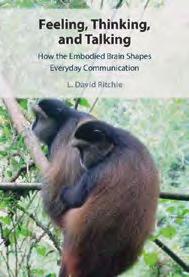
David Ritchie ’65 published his fifth book, an account of communication as a social, biological, and neurological force. A professor of communications at Portland State University, he also maintains a blog about language, meaning, and culture, especially metaphor and other forms of figurative language, informed by readings in cognitive and social sciences, at https://davidritchie-metaphors.blogspot.com. (Cambridge University Press, 2022)
The Laran Gambit (with Marion Zimmer Bradley)
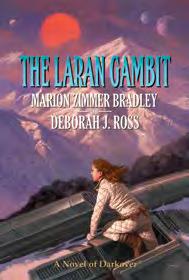
In the latest book release from Deborah J. Ross ’68, a power-mad tyrant turns to mind-control technology to silence the opposition, and a diplomat’s daughter appeals to psychics to save both of their worlds. Ross is the author of the acclaimed Darkover novels, collaborating and following in the footsteps of Bradley. She is also the author of The Seven-Petaled Shield series. (Marion Zimmer Bradley Literary Works Trust, 2022)
As Told by Herself: Women’s Childhood Autobiography, 1845–1969
Lorna Martens ’69 offers the first systematic study of women’s autobiographical writing about childhood in this literary history. Through more than 175 works, she explores the genre’s roots and development and recovers many works that have been neglected or forgotten. Martens is a professor of German and comparative literature at the University of Virginia and author of several books, including The Promise of Memory: Childhood Recollection and Its Objects in Literary Modernism . (University of Wisconsin Press, 2022)

Creativity: Hustlers, Fakers, and Thieves
Renowned craftsman Gary Rogowski ’72 has launched a podcast that is available on Apple, Spotify, Google, and from Uncle Vinny out the back of his Cadillac in the alley. Read about how Rogowski’s degree in literature led him to become a legend in the woodworking community in the Reed Magazine feature titled “The Philosopher of Sawdust” or watch him wax poetic about the five-minute dovetail on YouTube.
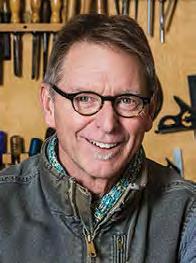
A History for the Future:
The Museum of Contemporary Art Los Angeles 1979-2000

With a narrative history by Louise Steinman ’73, this book was published by the Sam Francis Foundation. It was conceived as a cultural and educational initiative, a resource to share with cultural, civic, and educational institutions, artists, students, scholars, art professionals, and trustees and philanthropists. As such, volumes will be distributed to libraries, art schools, and museums worldwide. (Sam Francis Foundation, 2022)
Affordable Care Act as a National Experiment:
The
Health Policy Innovations and Lessons / The Jews of Attendorn
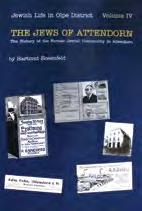
Harry Selker ’74 has had two book projects recently, all while leading two Institutes at Tufts University. The Affordable Care Act as a National Experiment: Health Policy Innovations and Lessons examines the landmark 2010 Patient Protection and Affordable Care Act (ACA) from the perspective of health policy research as translational science. Edited by him, it also includes an introduction, “The Affordable Care Act as a National Experiment,” which he wrote. (Springer 2021) The Jews of Attendorn by Hartmut Hosenfeld and translated by Selker, along with Melanie Adley and Charlotte Pattenden, surveys the history of the Jewish community of Attendorn from the medieval period until World War II. (Landrat des Kreises Olpe, 2020)
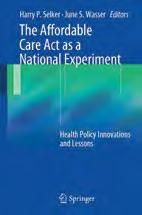
Heidegger in Ruins: Between Philosophy and Ideology
Richard Wolin ’74, Distinguished Professor of European Intellectual History at the CUNY Graduate Center, published his twelfth book earlier this year,. For years, Heidegger’s defenders have tried to separate his political beliefs from his philosophical doctrines, arguing that he was good at philosophy but bad at politics. Wolin explores what the 2014 publication of Heidegger’s “Black Notebooks” means for our understanding of the philosopher’s ideas and why his legacy remains radically compromised. He was recently featured on the New Books Network podcast talking about this reassessment of Heidegger’s philosophy. Wolin taught at Reed from 1982 to 1984 as an assistant professor in the departments of history, humanities, and political science. (Yale University Press, 2023)

21 MARCH 2023 Reed Magazine
REEDIANA
Tallis by Kerry McCarthy ’97
The musical biography Tallis by Kerry McCarthy ’97 tells the story of a composer who thrived in changing times. Thomas Tallis (c. 1505–1585) was born into what was essentially still medieval England; by the end of his career, he was living in a society transformed by cheap print, colonial ambitions, and the Reformation. This book traces Tallis’s creative life in a series of 15 vivid documents, taking the reader on a tour through the musical communities and architectural spaces where he worked. The discussion of Tallis’s music, illustrated by 60 online audio examples, offers an accessible portal into the sound-world of the Renaissance.
Kerry is a musician, a musicologist, an author, one of the world’s experts on English church music of the Renaissance, and one of the preeminent scholars on Tallis and William Byrd. Her book on Byrd, which garnered international acclaim, was given the 2014 ASCAP Nicolas Slonimsky Award for composer biography of the year. She discovered the delights of early music while in high school in Portland, joined the renowned Cantores in Ecclesia choir while attending Reed, and has been part of the Byrd Festival since it began. Kerry also performs with Cappella Romana, a vocal ensemble dedicated to combining passion with scholarship in its exploration of the musical traditions of the Christian East and West.
Quoting a profile in Stanford Magazine, “Kerry McCarthy fell in love with William Byrd over iced coffee in Portland, OR. She was a freshman at Reed College. He was the foremost composer of the English Renaissance. The 18-year-old alto was smitten as she sat in a café and read through Byrd’s Corpus Christi mass, preparing for a choral performance. At the time, she was a history major with scant musical training, but going through that score was like entering another world. ‘I was absolutely knocked over by it,’ says McCarthy. ‘This was some of the most beautiful stuff I ever heard—I didn’t yet realize this was one jewel in a whole structure.’”
For a deeper dive, Kerry discusses Tallis and Byrd in a three-part series of interviews (each running 90 minutes) available on YouTube as The Tudor Greats. (Oxford University Press, 2020)

Planet in Peril

The fifth book by Michael Bess ’79 is about the top mega-dangers facing humankind: climate change, nuclear weapons, pandemics, and advanced artificial intelligence. He explores how to get past ideological polarization and political fragmentation, drawing lessons from the environmental movement and the European unification movement, in responding to these global catastrophic threats. An award-winning historian of science and technology, Michael is Chancellor’s Professor of History at Vanderbilt University. (Cambridge University Press, 2022)
Human Medical Thermography
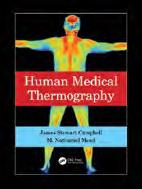
Mark Nathaniel Mead ’84 has coauthored his first medical textbook. Fully illustrated with both normal and abnormal images, this manual provides practical instructions on the physical needs of a thermography service, from the imaging room layout to the computer requirements. He shares that he first met his coauthor, James Campbell MD, way back in 1978, a year before attending Reed. “We reconnected fortuitously in a coffee shop in Winston-Salem in 2020, just as the pandemic was taking off.” (CRC Press/Taylor & Francis Group, 2022)
Undergraduate Research in History: A Guide for Students
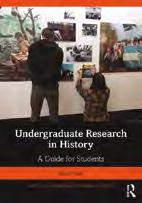
Molly Todd ’96 has written a textbook that offers a blend of theory and practice relevant to new routines of the digital age. This book provides practical advice, while also explaining how research by undergraduates fits into the broader contexts of the discipline of history. An associate professor of history at Montana State University, Molly has been appointed a resident fellow at the National Humanities Center for the 2022–23 academic year. (Routledge, 2022)
Capoeira Connections: A Memoir in Motion
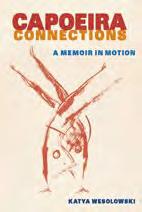
Katya Wesolowski ’92, a lecturing fellow in cultural anthropology and dance at Duke University, has written a book chronicling her long engagement (which began at Reed) as a practitioner, researcher, and instructor of the Afro-Brazilian combat game of capoeira and its practice around the world. “She reveals camaraderie and conviviality in the capoeira ring as well as tensions and ruptures involving race, gender, and competing claims over how this artful play should be practiced.” (University Press of Florida, 2023)
A Fortress in Brooklyn: Race, Real Estate, and the Making of Hasidic Williamsburg
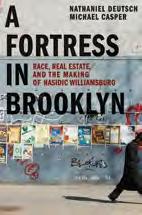
A new book by Michael Casper ’06 and Nathaniel Deutsch tells the fascinating history of how a group of determined Holocaust survivors encountered, shaped, and sometimes fiercely opposed the various urban processes that transformed their neighborhood, from white flight to gentrification. In 2021, the book won a National Jewish Book Award. (Yale University Press, 2021)
The Production of Everyday Life in Eco-Conscious Households: Compromise, Conflict, Complicity
In this new book based on qualitative interviews with parents of young children, Kristin Munro ’07, assistant professor of political science at the University of Texas Rio Grande Valley, describes what happens when people make daily choices about consumption and waste. Looking at the environmental values and practices of real families sheds light on the trade-offs involved in promoting sustainability at the household level as a solution to environmental problems. (Bristol University Press, 2023)
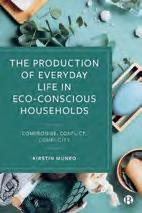
22 Reed Magazine MARCH 2023
Chronicle of a GoodLooking Family
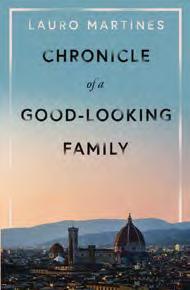
Lauro Martines, an assistant professor of history at Reed from 1958 to 1962, has written his second novel, and at two points in the story, the college features prominently. This fictional narrative follows the fortunes and misfortunes of three generations of the Castellani family as the fates buffet them between Florence and America. It is an exploration of familial loyalties and tensions and the ways in which “good looks and charms can sometimes turn to curses.”
(COGITO Publishing, 2022
The Real World of American Politics
by Professor Chris Koski and
Professor Peter Steinberger
In the standard areas of American political practice, working documents provide serious insight into the stakes, values, and processes that drive and inform the political system. By putting students in touch with the inner workings of this system, The Real World of American Politics, by Chris Koski, Daniel B. Greenberg Professor of Political Science and Environmental Studies, and Peter Steinberger , Robert H. and Blanche Day Ellis Professor of Political Science and Humanities, provides them with direct,
concrete access to the nuts and bolts— the real world—of government.
As Prof. Koski observes, “The power of governments often lies in the routine processes that fail to grab the headlines that loud members of Congress might. Our book,The Real World of American Government: A Documentary Introduction, explicates the political and policymaking processes of governments through a curated selection of documents that might otherwise go unnoticed in a typical American government class.”
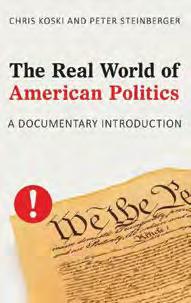
Hostages

Lucy Sexton ’13 was story producer for an HBO original documentary series that provides a detailed look at the history and repercussions of the Iranian hostage crisis in 1979. Also, she hired anthropology major Skyland Rice ’21 to help with research. Through four episodes that include “revelatory new interviews with the American hostages and Iranian hostage-takers alike, the series is a gripping chronicle of one of the most dramatic international deadlocks in American history, a deep dive into the geo-political history that led to the crisis, and an exploration of the political fallout that reverberates today.”
(HBO Max, 2022)
The Thunderbolt & the Monk

This new tome tells the story of Reed’s legendary calligraphy teachers, Lloyd Reynolds [English and art 1929–69] and Robert Palladino [art 1969–84], whose classes from the 1950s until 1984 inspired key figures in early digital typography. Between them they taught students Steve Jobs ’76 (Apple), Sumner Stone ’67 (Adobe Industries), and Charles Bigelow ’67 (Rochester Institute of Technology and Stanford University). The book, written by Nancy Stock-Allen, features more than 25 interviews of former students and associates, more than 200 images, and a historical survey of the development of the italic hand. The Book Club of California, publisher, has offered a 10% discount to any Reed student or alum. (Book Club of California, 2022)
This unique volume is no ordinary textbook; it includes a range of governmental actions from state of the state addresses, to the seating charts of state dinners, to the notice and comment period for seat width regulations, to the certification of electors, and more—all of the details involved in dealing with issues such as net neutrality, foreign lobbying, and campaign finance. (Rowman & Littlefield Publishers, 2022)
23 MARCH 2023 Reed Magazine
Class Notes
Class Notes are the lifeblood of Reed Magazine.
While a Reed education confers many special powers, omniscience is unfortunately not among them; your classmates rely on you to tell us what’s going on. So share your news! Tell us about births, deaths, weddings, voyages, adventures, transformations, astonishment, woe, delight, fellowship, discovery, and mischief.
Email us at reed.magazine@reed.edu. Post a note online at iris.reed.edu. Find us on Facebook via “ReediEnews.” Scribble something in the enclosed return envelope. Or mail us at Reed magazine, Reed College, 3203 SE Woodstock Blvd, Portland OR 97202. Photos are welcome, as are digital images at 300 dpi. And don’t forget the pertinent details: name, class year, and your current address!
EDITED BY JOANNE HOSSACK ’82
1951
Olly Williams is killing time recycling discarded wool clothing into rugs. They actually sell on the internet, to Olly’s surprise—but you won’t be surprised if you take a look at them! You can find them at lostine.com in the “Few of a Kind” category.
1953 70TH REUNION
It was a lover and his lass, / With a hey, and a ho, and a hey-nonny-no,
1954–59
New species include sea cucumber Bohadschia cousteaui and beetle Lepithrix freudi
1961
That o’er the green cornfield did pass / In springtime, the only pretty ring time, /
1962
Irene Heller Bettinger sends greetings “from Kansas City, Missouri, and the next-door state of Kansas, which set the country on an amazing path on August 2, 2022, when the majority of Kansas voters said NO to a constitutional amendment that would have led to termination of legal abortions in Kansas. When I retired from the practice of neurology in 2015, I began to volunteer for Planned Parenthood of Great Plains (Missouri, Kansas, Oklahoma, and Arkansas) to be a ‘provider of medical abortions.’ It is not a frequent situation for me. But when I am in town and not visiting grandkids in DC or Seattle, or at my place on Guemes Island off Anacortes, Washington, I can be available to be the ‘MAB provider’ for that day in the clinic. We serve women coming not only from Kansas and Missouri, but also large numbers from Texas and Oklahoma. If you are coming through or near Kansas City, it is a cool city and I would be happy to show you around.”
Virginia (Ginny) Oglesby Hancock [music 1991–2016] sent us a historic photograph, taken by Kathleen
Worley [theatre 1985–2014] in the chapel after the music department’s spectacularly successful Friday @ 4 chamber music concert on December 9, 2022. The photo includes all three of Fred Rothchild’s [music 1968–78] successors as directors of the private music instruction program: Bonnie Garrett [piano and harpsichord teacher 1978–2015, director 1987–2010, and instigator of Friday @ 4 concerts], Denise VanLeuven [longtime piano teacher, director 2010–20], and Monica Ohuchi [current private music instruction director]. The program continues to thrive, with ever-increasing numbers of students participating.

1963 60TH REUNION
When birds do sing, hey ding a ding, ding / Sweet lovers love the spring.
1964
New species include fish Astyanax kennedyi
1965
Gary Krane is successfully beta testing with LetzteGeneration.de in Germany the first simple tech specifically designed to enable nonviolent resistance (NVR)–tactics-based climate and economic justice (including union organizing and strikes) campaigns to be able to double and hopefully triple resister recruitment rates. Gary notes, “Historically, though elections have been essential to achieving almost all advances in the U.S. since the Civil War, electoral strategy has been absolutely insufficient without being joined by a mass NVR movement, still barely nascent in America as we
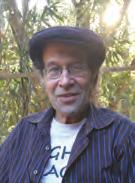 These Class Notes reflect information we received by December 15. The Class Notes deadline for the next issue is March 15.
teeter
These Class Notes reflect information we received by December 15. The Class Notes deadline for the next issue is March 15.
teeter
“Reed offered me generous financial aid, without which I would have never attended.
I support Reed’s mission and donate to keep that mission alive.”
—HYUN GU KANG ’15 reed.edu/givenow
After the Friday @ 4 concert December 9, left to right: Monica Ohuchi, Virginia (Ginny) Oglesby Hancock ’62, Bonnie Garrett, and Denise VanLeuven.
24 Reed Magazine MARCH 2023
Gary Krane ’65 is working on nonviolent resistance tech to save the planet.
on a fascist coup and a mostly unlivable planet in 10–15 years.”
David Ritchie is still teaching at Portland State and leading the active outdoor life, including volunteer trail maintenance work for Trailkeepers of Oregon and the Pacific Crest Trail Association. David rafted Desolation Canyon on Utah’s Green River this summer, and published his fifth book in September. (See Reediana.)
1966
Incurably stamped by nights talking into a microphone, first at Reed radio station KRRC and then at other community stations in Boulder, Colorado, Don Deane is now trying to convert his hobby into a professional side hustle as a voice actor. (So, seemingly, is almost everyone else with a mouth, but hope springs eternal, though Wait Wait Don’t Tell Me’s Bill Kurtis and the late Carl Kasell have little to worry about.) Don is happy to offer Reedies irresistible deals on recordings of their phone answering messages or (depending on length and complexity) other scripts.
1967
This past summer Ruth Lindauer Sherman (also MAT ’68 ) journeyed from Oregon to visit her college roommate, Dr. Catherine Collier Kisska ’68, at her ranch, Los Lagos, in the Colorado Rockies. Ruth retired years ago from teaching languages at schools in the Portland area so she could travel, spend time with her granddaughters, do volunteer work, and contemplate the joy of doing nothing. Catherine recently retired from her career as a nationally known diversity specialist and author of many books on diversity. She is at present enjoying the serenity of the woods at her cabin. Both Ruth and Catherine have traveled extensively internationally, often together, most recently to South Africa and France with family and friends.

1968 55TH REUNION
Peter Langston was recently interviewed by Italian filmmaker Nicola Pisano for his series Videogame Legends about the videogame company he started for George Lucas that later became
LucasArts and about his many computer games, including the well-known and obsessively addictive game Empire (which stole its name from the Reed College board game).

The latest book release from Deborah J. Ross (with Marion Zimmer Bradley) is The Laran Gambit. (See Reediana.)
1969
Lorna Martens has a book out! (See Reediana.)
1970
Richard McClelland wrote in December, “I am glad to report good health and enjoying my 10th year in retirement, living here in Canada. I gave up my U.S. citizenship five years ago and enjoy being Canadian and Irish (both by descent). I am keeping busy with research, writing, and publication, often in the pages of The Journal of Mind and Behavior, which is out of the psychology department at the University of Maine. My most recent publications are all at ResearchGate for anyone who wishes to see them. And I wish all my Reed friends (and enemies) well in this forthcoming new year.”
1971
David Comfort’s current publications in philosophy and literature include “Kryptonite of the Übermensch: The Purgatory of Soulmates Schopenhauer and Nietzsche” in The Philosopher (from the century-old Philosophical Society of England), Spring 2023; “Divine Madness: A Brief History of Literature’s Blessed Lunatics” in the Montréal Review, November 2022; and upcoming in 2023, “Late Great Literature: The Swan Song” in Pennsylvania Literary Journal
1972
Gary Rogowski has just launched a new podcast on creativity. It’s available on Apple, Spotify, and Google Podcasts and from Uncle Vinny out the back of his Cadillac in the alley. (See Reediana.)
Sibylle Hechtel has moved to north of Telluride and has a new job as a ski instructor at Telluride Ski Resort! She started work on December 26.
1973 50TH REUNION
Eduardo Ochoa retired after serving 10 years as president of California State University, Monterey Bay, and 39 years overall working in five CSU campuses. In recognition of his service, the CSU trustees conferred on Eduardo the title of President Emeritus. Holly Byers Ochoa and
have decided to remain in
 Eduardo
Dr. Catherine Collier Kisska ’68 relaxes at her ranch. Photo by Ruth Lindauer Sherman ’67, MAT ’68.
Peter Langston ’68, group leader of Lucasfilm’s design group, as seen in the San Jose Mercury News, May 9, 1984.
Eduardo
Dr. Catherine Collier Kisska ’68 relaxes at her ranch. Photo by Ruth Lindauer Sherman ’67, MAT ’68.
Peter Langston ’68, group leader of Lucasfilm’s design group, as seen in the San Jose Mercury News, May 9, 1984.
25 MARCH 2023 Reed Magazine
Eduardo Ochoa ’73 and Holly (Byers) Ochoa ’73 are happy that their sons Michael (left) and Eric Ochoa live near them in the Monterey, California, area.
the Monterey Bay area, moving out of the campus-provided house into their home in the heart of the city of Monterey. Holly and Eduardo continue to serve on several boards. Eduardo’s list includes Reed’s own board of trustees and the board of directors of the American Association of Colleges & Universities. They are thrilled that both of their sons, Michael and Eric, have chosen to live close by them in the Monterey area.
Kathy Dyson Roseth, having retired in 2013 from a 25-year career developing and managing low-income housing in Seattle, is now preparing for her first solo show of paintings at Gallery110 in Seattle. The show, which opens May 4 and runs through May 27, will feature over 15 still-life paintings of artisan works from different cultural traditions—Afghan weavings, Iranian rugs, Otomi embroidery from Mexico, Hardanger embroidery from Norway, and others. “Most of the items have been in my house for decades, picked up on travels or given as gifts. The paintings celebrate the beauty of domestic crafts, beauty which does not call attention to itself as art but serves a similar purpose, to comfort and inspire us and show us something of what it means to be human.” Kathy received her art training at Gage Academy of Art in Seattle.

A History for the Future: The Museum of Contemporary Art Los Angeles 1979–2000, with a narrative history by Louise Steinman, was published this fall.
(See Reediana.)
1974
Harry Selker has published two books!
(See Reediana.)
Richard Wolin’s 12th book is out!
(See Reediana.)
1975–76
Between the acres of the rye / With a hey, and a ho, and a hey-nonny-no,
1977
Barbara J. Anello was awarded a Fulbright Specialist grant for a workshop in photographic documentary of heritage sites and structures for the staff of APSARA Authority, National Authority of Preah Vihear, and other agencies under the Cambodian Ministry of Culture and Fine Arts. This project continued work Barbara has been doing since 2018 and will continue in 2023, toward capacity building of young professionals working in the world heritage sites of Cambodia through several U.S. State Department programs and with the support of the American Embassy, Phnom Penh, and UNESCO, Phnom Penh. In 2019–20, Barbara, teaming up with photographer Amine Birdouz and heritage professional Ginevra Boatto, offered a 10-month course in photographing fine art and artifacts, held at Angkor Conservation Office. The 6-week Fulbright Specialist workshop (held last November and December) in shooting on-site continued the focus on instruction in documenting heritage architecture and sites. In her work, Barbara also teams up with local teachers like Heng Dara, principal of The Global Child School, to bring heritage education to the community, and especially to youth. Her courses and workshops are intended to enhance the understanding of art and architectural history and help inspire the next generation of cultural heritage professionals.

1978 45TH REUNION
Last September, Janice Grubin was selected to the 2022 New York Metro Super Lawyers list, for what may be the eighth year in a row. Janice is also very proud of serving as the cochair of her firm’s Restructuring, Bankruptcy and Creditors’ Rights practice group; a LeGaL board member and cochair of LeGaL’s Judiciary Committee; and a member of the Committee on Character and Fitness for the New York State Supreme Court, Appellate Division, First Department. Check out her web bio at Barclay Damon: https://www.barclaydamon.com/ profiles/janice-grubin.
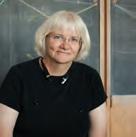
1982
Eric Britton was recognized in the 2023 edition of The Best Lawyers in America® for Employee Benefits (ERISA). Until the end of 2022, Eric was a partner at Shumaker in Toledo, Ohio. Eric also notes that he had a great time walking the Camino de Santiago in Spain in October.
1983 40TH REUNION
William Ansell wrote, “Nothing special, just always wanted to see my name in the magazine before I saw my former roommate John Bredehoft.” The ball’s in your court, John!
“I continue to give to Reed every year because of how my Reed experience transformed my life and continues to through alumni relations and the Southern California chapter’s book club in particular.”
—WAYNE D. CLAYTON ’82 reed.edu/givenow
1979
The fifth book by Michael Bess was published in October. (See Reediana.) Jody Nathan retired from the practice of law in Tulsa, Oklahoma, in June 2022.
1980–81
These pretty country folks would lie / In springtime, the only pretty ring time
Don Asher got married in Reno, Nevada, on September 25, 2022, with several Reedies in attendance. A very good time was had by all.
In the summer of 2022, David Berrigan cycled across the country from Seattle to D.C., roughly following the Railsto-Trails Conservancy’s Great American Rail-Trail. “It was totally great, and hit me up if you plan a trip and want some ‘lessons learned.’” Along the way he visited Liz Queathem ’84 in Grinnell.
Class Notes
clockwise from top: Heng Channick, stone conservator in training, at Pre Rup Temple, Angkor Archaeological Park, Cambodia. Photo by Barbara Anello ’77, March 13, 2022.
Kathy Dyson Roseth ’73 will have her first solo show of paintings in May.
26 Reed Magazine MARCH 2023
Left: Carpenter’s Wheel and Apple, oil on canvas, 24 × 18 in., 2022.
1984
In April, Mark Nathaniel Mead and his wife Sabine moved from Chapel Hill, North Carolina, to Copper Hill, Virginia. John has also coauthored his first medical textbook. “I first met my coauthor, James Campbell, MD, way back in 1978, the year before I attended Reed. We reconnected fortuitously in a coffee shop in WinstonSalem in 2020, just as the syndemic was taking off.” (See Reediana.)
1985
Rich Brownstein’s book Holocaust Cinema Complete (see March 2021 Reediana) has won the Choice Magazine Outstanding Academic Title award!
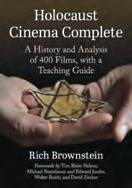
1986–87
New species include sea slug Eubranchus steinbecki, jellyfish Phialella zappai, and fly Dicrotendipes thanatogratus
1988 35TH REUNION
Gita Ghei is a teaching artist and mother of two; her eldest daughter is in Reed’s class of 2023. She recently completed a certificate in herbal studies and is involved in forest restoration in southeast Minnesota.
1989
Erik Brakstad writes, “While I’ve been a general contractor since the late 20th century (Brakstad Builders), my main gig the last eight years has been as a construction trainer for Tivnu: Building Justice. Tivnu is a Portland-based Jewish social justice gap year program with a focus on participants gaining hands-on construction experience. Most of what we do in the community is working on the front lines of Portland’s houselessness crisis. A long-time summer camp guy, last year I took on directing a twiceyearly Norwegian language program for adults in Bemidji, Minnesota. Affiliated with Concordia Language Villages, Skogfjorden’s adult residential program provides rich informal learning opportunities for participants to engage and
broaden their knowledge of Norwegian language and culture.”
After 30 years living outside the U.S.—Paris, Munich, Athens, Hamburg, London, Berlin, Shanghai, Rouen, Nantes (and no, not on a witness protection program)—Alexia Cassimatis has moved to Westport, Connecticut, so her 14-year-old daughter can attend high school. She does sorely miss the Reedies in Paris and all their escapades, but she’s happy to have made contact with Mark Aronson ’79, and continues to see Cathy Altman Nocquet ’78 when she’s in New York.
1990
When birds do sing, hey ding a ding, ding / Sweet lovers love the spring.
1991
Joli Bennett moved back to Portland in October and would love to connect with local Reedies!
Deepak Sarma wrote in September, “I am happy to report that my work as a cultural consultant (in addition to being a professor) has had a significant impact this year. First, my name appears in the credits of Deepa & Anoop , a children’s animation program on Netflix. I also worked on Thomas the Train with Mattel, Ghee Happy with Netflix, on CoComelon Lane and Little Baby Bum with Moonbug Entertainment (these programs are still to be released). And, more recently, I am thrilled to let you know that the Diwali cards that I worked on as a consultant for American Greetings are now available at Targets across the United States! I helped with the designs, images, formatting, and writing the copy on all four that are for sale. (BTW, since I acted as a consultant I do not get any royalties, so no conflict of interest.) It has been a busy and fruitful year indeed!”
clockwise from top left: Deepak Sarma ’91 helped create these Diwali cards that are sold in Targets across the U.S.

At the wedding of Don Asher ’83, left to right: Roxi Power ’85, Sarah “Sally” Hautzinger ’85, Bruce Johnson ’82, Heather Allen Johnson, bride Debra Ann Freeman, groom Don, Stephany Watson ’82, Tony Fisher ’80, and Clary Nelson Healy ’84.

Eric Britton ’82 retired as one of The Best Lawyers in America® .
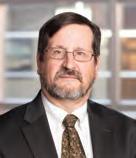
Holocaust Cinema
Complete by Rich Brownstein ’85 won the Choice Magazine Outstanding Academic Title award!
Jancie Grubin ’78 is a Super Lawyer!
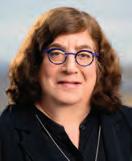
Reedies at the Fondation Louis Vuitton in Paris on March 7, 2020, left to right: Claire Baker ’18, Alexia Cassimatis ’89, David Holinstat ’78 and his wife Renate Zink (who live in Stuttgart and who came to Paris for the event), Hayden Veytia ’20, David Hans ’98.

27 MARCH 2023 Reed Magazine
1992
Katya Wesolowski is a lecturing fellow in cultural anthropology and dance at Duke University. My book, Capoeira Connections: A Memoir in Motion, will be published by University Press of Florida in January 2023. It chronicles her long engagement (which started at Reed!) as a practitioner, researcher and instructor of the Afro-Brazilian combat game of capoeira. (See Reediana.)
After years of wanting to get into voice acting, John Worsley is delighted to have a small but important role (Attorney John Masters) in the episode “No Motive for Murder” on the podcast Hot Copy Radio Theater. The podcast reproduces the 1940s radio drama Hot Copy, which follows a female reporter who solves mysteries. John looks forward to more!
1993 30TH REUNION
Newly described trilobites include Struszia (Avalanchurus) lennoni, Struszia (Avalanchurus) starri, Struszia (Struszia) harrisoni, and Struszia mccartneyi
1994
Newly described trilobites include Borealarges calei, Borealarges morrisoni, Borealarges reedi, and Borealarges tuckerae.
1995
Yi-Kang Hu, PhD, JD, was elected as city councilor of Tigard, Oregon, in the 2022 general election. In his day job, he is a food and drug lawyer working with food, drug, and cosmetic companies to help them navigate the regulatory framework of the U.S. Food and Drug Administration.

1996
Dave Hayden made a thing (with a lot of help): http://play.date/.
Molly Todd has been appointed a resident fellow at the National Humanities Center in Durham, North Carolina,
where, for the 2022–23 academic year, she is living the best research and writing life in a light-filled office with a forest view. (Live in the area? Get in touch!) She also is immensely relieved to finally set to flight the long-COVID project, Undergraduate Research in History: A Guide for Students . (See Reediana.)
1997
Kerry McCarthy missed her 25th reunion because she was in the middle of a research fellowship at Magdalen College, Oxford. She is at work on her fourth book, a wide-ranging study of the lives of professional singers in Renaissance England. Her most recent publication was a biography of Tallis.(See Reediana.)
1998 25TH REUNION
This carol they began that hour / With a hey, and a ho, and a hey-nonny-no
1999–2000
How that a life was but a flower / In springtime, the only pretty ring time
2001
reed.edu/givenow
[Correction: We used the wrong pronouns for Kimber Nelson in the September 2022 issue; we are very sorry, and will henceforth be extremely
attentive to pronouns. The corrected class note is below.]
In May, after nearly a decade of obsessive work, Kimber Nelson obtained a Professional-level Track & Sign certification in identification and interpretation of the evidence of wildlife presence and behavior through Tracker Certification North America. He’s been applying this skill to community science projects documenting rare carnivores in Oregon, while continuing his paid work as a family medicine clinic nurse.
2002
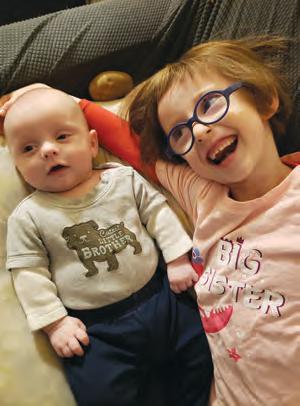
Dan Harris-McCoy is currently chair of the Department of Religions & Ancient Civilizations at the University of Hawaii. In true Reed fashion, he is enjoying teaching a course on the “History of the Written Word,” which is really just an excuse to do calligraphy. Here are some examples of his students’ work. Kim Harris-McCoy ’03 is working (remotely) as a COVID epidemiologist for Los Angeles County and had an article published by the CDC in late 2021 that helped guide national policy.

2003 20TH REUNION
When birds do sing, hey ding a ding, ding / Sweet lovers love the spring.
Notes
Class
“I want as many students as possible to have access to a Reed education, regardless of financial need.”
—KATHRYN PINTO ’95
Yi-Kang Hu, PhD, JD, was elected as city councilor of Tigard, Oregon
Insular majuscules, by a student in Dan Harris-McCoy ’02’s History of the Written Word.
28 Reed Magazine MARCH 2023
Mighty Martha welcomes brother Warren Francis Earl to the family of Kristen Earl ’05.
2004
And therefore take the present time / With a hey, and a ho, and a hey-nonny-no
2005
Mighty Martha (by way of Kristen Earl) is thrilled to announce that their brother Warren Francis Earl was born in August 2022. Martha says, “Warren is the best and I love him. He was born five weeks early and was in the NICU hospital for two weeks. But now he is home! I like this magazine. I think you should have photos of my very good friend Mela (Kunitz ’87) in it.”
2006
Michelle David is a professional arts and adventure enabler. “I started in this illustrious career while at Reed, where I worked as O-Week and Paideia coordinator. After seven years, I’m stepping down as communications director for the Portland Winter Light Festival, an organization I’ve been with since its founding in 2016. My first step towards making rad things happen in Portland was by being a Gray Fund intern (shout out to SevaPriya Barrier [student activities 2003–06] for her encouragement to apply!). The last time I was on campus for reunions, it was super gratifying to see a Gray Fund trip advertised to go to the Portland Winter Light Festival—the Reedie energy going full circle. Thanks, Gray Fund! Stepping down from that role allows me to focus on my current professional trajectory as arts, music, and culture liaison for the mayor’s office. Serving in City Hall at this time is an absolute treasure.”
2007
Loren Albert writes, “I am excited to share that I am moving back to Oregon!
clockwise from top left: We guess Jessica Gerhardt ’11 and her friend Snubby J must be having fun in their “Stop Uke-ing Tubes” Talking Heads tribute video.
Reedies at the wedding of Tom Chartrand ’09 and Rosie Pine ’11, clockwise from left: Hilary McMahan ’10, Bryan Head ’09, Alex Ragus ’11, Rossy Tzankova ’09, Tom, Rosie, Andrew Lyon ’10, Kevin Henner ’10, Monica Gerber ’10, Hannah Fouasnon ’09, Jacob Elias, Rachel Fordyce ’09, Kaia Maclaren ’11, and Christian Anayas ’10.
Sasha Kramer ’99, Adrienne Lane ’11, and Claire Remington ’11 connect at the UNC Water and Health Conference.

The family of Kris Russell ’08, now with two daughters!

And a kitten!

I’ve accepted a position as an assistant professor at Oregon State University in the Department of Forest Ecosystems & Society. Hopefully that means I will actually make it to reunions some year soon!”
Kirstin Munro has a book coming out this month from Bristol University Press. (See Reediana.)
2008 15TH REUNION
Kris Russell writes, “It was a big year in our house! My husband, Tim Nolan, and I welcomed our second daughter in May and a new kitten in June, and I was elected to the partnership of Stoel Rives LLP this fall, effective as of January 1, 2023. (The dog remains difficult to photograph, but enthusiastic about the extra creatures to snuggle.)”
2009
Tom Chartrand and Rosie Pine ’11 marked 10 years of partnership with a marriage celebration on the shores of beautiful (but smoky) Lake Wenatchee,

Washington. Family and friends (many Reedies) showed up in force with love and support throughout the weekend!
2010
For love is crownèd with the prime / In springtime, the only pretty ring time / When birds do sing, hey ding a ding, ding / Sweet lovers love the spring.
2011
Jessica Gerhardt and her friend Snubby J recorded a ukulele and RimbaTubes Talking Heads medley with an accompanying music video and called it “Stop Uke-ing Tubes”! “What began as a fun passion project grew into a year-long endeavor that involved numerous costume changes and filming locations. We’re proud of the final product, which we released in October 2022.”
Reedies connected to discuss the way the world works on water, sanitation, and hygiene issues at the UNC Water and Health Conference in October. Sasha Kramer ’99 and Claire

29 MARCH 2023 Reed Magazine
Class Notes
Remington both work for SOIL to increase household access to safely managed sanitation in Haiti, and Adrienne Lane works for Water for Good to improve and scale durable water services that will last for the people of the Central African Republic.
2012
Don Berg ’s new book came out in December. Don and his partner, Joyce O’Halloran, attended seven conferences on two continents in 2022. One conference was in England, and they took advantage of that trip to also visit France. Before that trip, on the last evening of a July camping trip, a pair of dogs spooked Brianna, the most inexperienced of their four pack llamas. The hardware on Brianna’s tieout broke, as intended to prevent her from breaking her neck in such situations; she outran the dogs easily and was off in the woods overnight. In the morning, with the help of fellow campers, Don and Joyce learned that Brianna was on the Pacific Crest trail heading toward the Frog Lake parking lot, and then that she’d arrived at the parking lot and then headed out towards Highway 26. A very helpful couple gave Joyce a ride to Brianna’s location next to the highway behind a guardrail. Joyce almost caught her, but Brianna hopped over the guardrail, crossed the highway, and bounded up a slope too steep for humans to ascend. Eventually, after a park ranger arrived and stopped traffic on the highway, Brianna was induced down the less steep portion of the slope and Joyce finally caught her. Brianna was none the worse for her adventure, though Don strained a knee while navigating the “easier” slope. (See Reediana.)

Sarah Semon says, “Hi class! I am currently a third-year internal medicine resident in Brandon, Florida. I just
matched into an infectious disease fellowship at UC Davis and am excited to move back to the West Coast come summertime!”
2013 10TH REUNION

Lucy Sexton was story producer on an HBO original documentary series that premiered in fall 2022. (See Reediana.)
2014
New species of parasitoid wasp genus Aleiodes include Aleiodes colberti, Aleiodes elleni, Aleiodes falloni, Aleiodes shakirae, and Aleiodes stewarti.
2015
Eve Mozur recently started a new job at Colorado School of Mines as a materials scientist and is setting up a research lab. “Since reaching out to a Reed alumna with a research group ( Mary Jo Ondrechen ’74 to give credit) started my research career I wanted to make sure that my information is available to Reedies as well.”

2016–17
New species include ant Zasphinctus obamai, bee Lasioglossum obamai Genaro, fish Tosanoides obama, fluke Baracktrema obamai
2018 5TH REUNION . . . and spiders Spintharus barackobamai and Spintharus michelleobamaae.
2019
Congratulations to Ashlee Fox, one of 20 graduate students selected from a pool of nearly 1,000 for the 2022 class of Samvid Scholars, a merit-based graduate scholarship established in 2021 by Samvid Ventures to invest in the graduate education of future leaders who are committed to effecting positive change in society. In addition to receiving up to $100,000 in funding for their graduate program, Samvid Scholars engage in two years of leadership development programming to support them to fulfill their extraordinary potential to drive change. Ashlee is currently attending Yale Law School.
2020–22
New genus of east African huntsman spiders, Thunberga, first described in 2020; contains 29 species as of April 2022.
“I only attended Reed because of the generous financial aid I received. I understand that financial aid is mostly from alumni donors like me, so I make a point of giving back so others can have what I was so lucky to be given.”
—LUCY SHOEMAKER ’98
reed.edu/givenow
The 2022 class of Samvid Scholars has the good fortune to include Ashlee Fox ’19!
30 Reed Magazine MARCH 2023
Don Berg ’12 and Joyce O’Halloran on the trail with their pack llamas Pepe, Brianna, D’Ande, and Fonzie.
REUNIONS
SAVE THE DATE
Relish all that you love about Reed(ies) during Reunions weekend.
Join your fellow alumni on campus for a spectacular weekend full of traditions, class revelry, and more.
Plus—if your class year ends in a 3 or 8, you have a quinquennial anniversary to celebrate!
JUNE 7–8 2023

ALUMNI COLLEGE
ARTISTS, CREATORS
HERE, THERE, AND BACK AGAIN & CRAFTSPERSONS
Attend events, talks, seminars, and hands-on workshops led by Reedies who have found success through creative pursuits. Topics include art and craft; book, fiber, and culinary arts; digital media; fermented beverages, and more.
8–11 2023 JUNE
reunions.reed.edu
EDITED BY RANDALL S. BARTON Email bartonr@reed.edu
Devoted to Maintaining Reed’s Excellence
Stephen R. McCarthy ’66 [Reed trustee 1988–2009]
January 2, 2023, in Portland, from Parkinson’s disease. Steve was often described as the perfect Reedie. Serial entrepreneur, outdoorsman, lover of art, savvy marketer, perfectionist, passionate advocate, he captured the restless quest for excellence, knowledge, and the well-lived life that motivates so many students at Reed.
A second-generation Reedie, his service to the college began as a student when he was elected student body president. It continued as an alumni board member from 1971–72 and led to his appointment to the board of trustees, where he served with distinction for 21 years. As a trustee, Steve contributed greatly to the health of the college.
“In his many-faceted work to change the world for the better, Steve’s leadership of two presidential searches stands out,” said Hugh Porter, vice president for college relations and planning, referring to the appointments of Reed Presidents Steven Koblik [1992–2001] and Colin Diver [2002–12]. “Steve would do anything to find the right president for Reed College. He understood the daunting challenges of the college’s precarious finances and distributed governance structure—and firmly believed it was a great job. He approached the job like a mountaineer, indefatigable and adaptable. A favorite story of his was jumping out of a shower to speak with Apple CEO Steve Jobs about his extensive thoughts on the Reed presidency.”
Serving as vice-chairman of the board from 1998 to 2005, Steve helped identify and recruit 24 new trustees and provided wise and energetic leadership on the trusteeship committee— including three years as its chair. He also played an important role on the development committee. In 2002, Steve was presented with the college’s highest recognition for its volunteers, the Jean Babson Award.
He was the eldest of four boys born to Kate Rogers McCarthy ’39 and Gerald McCarthy, who worked in the orchard business and then as manager of Umpqua Plywood in Roseburg. The family moved several times in the ’40s and ’50s. Steve began school in Tacoma, Washington, and graduated from high school in Roseburg, Oregon. He remembered Roseburg as an “isolated, claustrophobic small town,” but during his senior year in high school, Kate took her children to Grenoble, France, so they could take classes at a local university and drink in the culture. In
Steve, it ignited a perception of the richness of the European lifestyle. After returning to Roseburg, he was accepted at both Reed and Stanford, but chose Reed because it seemed to offer rigor, intellectual freedom, and independence.

He majored in political science, took courses in biology, and, until he moved off the campus the second semester of his sophomore year, he did well. At that point Steve began to lose interest in his studies and became obsessed with the notion of mountain climbing. A summer job doing biological research in Alaska provided him with the money to travel to Kathmandu with Gary Payne ’65 and David Wyatt, a friend of his from Roseburg. While they were descending
from a mountain in the high Himalayas, Wyatt fell to his death. Steve was devastated.
He hiked out of Kathmandu, took a steamer to Marseilles, and worked at a hotel in Geneva. Eventually he took a steamship from London to New York, hitchhiked across the country, and arrived back at Roseburg in March of ’64, deeply affected by Wyatt’s death. The Vietnam War was heating up, and because at the time undergraduate college enrollment was an automatic deferment, the woman who ran the local draft board encouraged him to enroll immediately at the University of Oregon. He started at the U of O in the spring of 1964, but that fall returned to Reed. He was immediately aware that the place
In Memoriam
32 Reed Magazine MARCH 2023
had changed. There were more students, and the civil rights, antiwar, and sexual liberation movements were in full swing. Drugs were also sweeping up the coast.
“Many of the things I had taken for granted the first two years I was there—the sort of mellowness of the place, the seriousness of our interest in academics, the kind of charitable, kindly atmosphere of an undergraduate school . . . seemed to acquire a terrible edge in that second twoyear period,” Steve remembered. “I had a sort of meltdown experience.”
The following summer, he began working on his thesis, “Two Innovations in Oregon State Government,” advised by Prof. Richard Frost [political science 1960–69]. Planning to use his thesis as a springboard into the Oregon political scene, he scraped together enough money to get an apartment in Salem and begin research. He also got involved in the gubernatorial campaign of crusading journalist Tom McCall.
Steve went on to earn a law degree from New York University and then practiced law for three years. He was hired as executive director for the Oregon Student Public Interest Research Group (OSPIRG) until 1974, when he joined TriMet, Portland’s public transportation agency, where he served as assistant manager and acting general manager. From 1979 to 1987, he was president of Michaels of Oregon, a family-owned manufacturer of hunting and shooting accessories.
He married Lucinda Parker ’66, a Boston native who studied at New York’s Pratt Institute and at Reed. Lucinda has achieved great success as an artist. Her works hang in the Hallie Ford Museum at Willamette University, the Seattle Art Museum, Portland City Hall, the Oregon Convention Center, Reed’s Performing Arts Building, the performing arts center at Lower Columbia College in Longview, Washington, and the federal courthouse in Bakersfield, California, among others.
As an adult traveling in Europe, Steve developed an appreciation for the fruit brandies produced in Germany, France, and Switzerland. “It was a matter of great interest to me why the Americans couldn’t make these wonderful truefruit brandies,” he said. “I’d go to Europe and buy a bottle and bring it back with me and six months later it would be gone. I’d go to the local liquor store to try to find some and it didn’t exist. Nobody knew what I was talking about.”
Eau de vie—what the Germans call schnapps—is a brandy made from pure fermented fruit, which is distilled. There is nothing in the product that wasn’t growing on the tree. It is the most authentic way to make brandy, but alas, also the most expensive and slowest. Steve described pear eau de vie as “a condensed mist of pear.”
He decided to produce his own and began studying with people at distilleries in Germany, France, and Switzerland. He picked up a few tricks of the trade in Europe, but ended up
learning more through trial and error. Perhaps the key thing he learned was to concentrate on what’s nearby.
“Eventually I came to appreciate that the people I met ate and drank only what they grew,” he said, “what they had. Their genius was taking whatever they could grow and making something wonderful out of it.” Returning to Oregon, he started with one of the things the state grows best—fruit.
In 1985, he opened Clear Creek Distillery in Northwest Portland, producing eau de vie made from Bartlett pears grown in his family-owned orchards. It took 30 pounds of pears to produce one 750-ml bottle of pear eau de vie. The New York Times spirits critic said it might be the best brandy ever made in the United States.

It was slow going at first, making small batches and rejecting a lot of what was made. The first two years, Steve worked at the distillery on nights and weekends while running his other business, a hunting and shooting equipment company. After selling that business in 1987, he began distilling full time. He spent long hours on the road, trying to win over distributors, retailers, and restaurants, which he called “a humbling, real-world experience.”
Within years, Clear Creek Distillery added apple brandy from Golden Delicious apples grown in Hood River and aged in old Limousin oak cognac barrels; framboise fermented from Sauvie Island raspberries; kirschwasser from cherries grown in the Hood River valley or The Dalles; and slivovitz from Forest Grove blue plums. They would also produce Italian-style grappas, a singlemalt whiskey, and unaged grape brandy that Steve sold to vintners to fortify such wines as port.
“Stephen is one of the two or three best distillers in America,” wrote F. Paul Pacult, editor and managing director of the Spirit Journal newsletter, which went to 20 million readers worldwide. “He shows incredible attention to detail. He has passion.”
In 2014, Steve sold Clear Creek Distillery to Hood River Distillers, Inc.
Steve joined the board of trustees at Reed in 1988. His first board meeting was President Paul Bragdon’s last. Steve believed that Bragdon’s presidency had essentially saved Reed College at a time it was teetering towards insolvency. But there were still many issues to be resolved, beginning with the low rate of student retention.
“We were living with a situation where over half the people that came to Reed left,” he said. “And we had developed a rather elaborate ideology that said ‘That’s okay.’ My 20 years on the board of trustees have been an effort to turn that all around.”
Shortly after joining the board, he was asked to co chair a drug and alcohol task force by Reed President James Powell [1988–91]. Steve also worked to improve the quality of student life, including improving the food that was served in Commons. He and Lucinda were especially supportive of the Gray Campus Center, a
HONOR THEIR
IN THE SPIRIT OF REED
giving.reed.edu
name.
Honor your professors and classmates with a gift to Reed in their
You can make Reed possible for the next generation.
Memory
challenging project that dramatically improved Reed’s facilities for student life and music performance. They also founded the Stephen R. McCarthy ’66 and Lucinda Parker McCarthy ’66 Scholarship.
Steve and Lucinda supported the college through special gifts to Reed’s major fundraising campaigns and with very generous unrestricted support to the Annual Fund. Steve worked hard to recruit other alumni to the college’s cause, particularly as chair of the Annual Fund and as a member of the campaign committee for Reed’s second major fundraising campaign, which concluded in October 2000, having raised over $112 million. During the development office’s formative years, Steve was a sounding board for managers and helpful in welcoming and mentoring new staff. In honor of this work, Steve received the college’s development recognition award in 1999.
When President Koblik was leaving campus, he thanked Steve for his important leadership on so many fronts and especially for his engagement with Reed in Portland and support for local college events.
Steve provided important leadership for many other organizations, including the Nature Conservancy, the Columbia River Gorge Commission, earthjustice Legal Defense Fund (formerly Sierra Club Legal Defense Fund), and 1000 Friends of Oregon.
He is survived by his wife, Lucinda ParkerMcCarthy; his daughter, Abigail McCarthy; and his brothers, Timothy, Kermit, and Michael. The college will host a memorial service for Steve from 3 to 5 p.m. on Saturday, April 22, 2023, at Kaul Auditorium, with a reception following in Gray Lounge.
Prof. Dell Lynn Rhodes [psychology 1975–2006]
October 18, 2022, in White Salmon, Washington, from complications of a long-standing illness. For 31 years, Prof. Dell Rhodes was a commanding force on Reed’s campus.

In a joint statement, Dean of the Faculty and Professor of Psychology Kathryn Oleson and Prof. Enriqueta Canseco-Gonzalez [psychology] spoke of the tremendous impact Rhodes had on the college, on the psychology department, and most importantly on students and faculty.
“She was a remarkable role model and mentor to students and junior faculty alike, and a close friend to many,” they said. “We remember Dell’s high standards for excellence, her keen insights into the complicated workings of Reed, her incredibly detailed review of each and every single line on research or student papers, her enthusiasm for developing students into researchers, and her unflagging hard work and dedication.”
Born in Kansas, Rhodes spent most of her youth in Colorado, where she was an avid skier, hiker, Girl Scout Mariner, and an excellent student. Awarded a Boettcher Scholarship, she graduated from Colorado College with a degree in psychology. During her sophomore year, she developed a severe form of rheumatoid arthritis, which presented physical and medical challenges throughout the remainder of her life. Undeterred, she went on to graduate school and received her PhD from UCLA.
Quickly hired as an assistant professor of psychology at Reed, Rhodes became a beloved teacher, mentor, and celebrated faculty member. She rose to the rank of full professor, mentored 84 thesis students, and was renowned for her courses in introductory psychology, biopsychology, sensation and perception, and emotion. Students found her brilliant and supportive;,demanding but caring. She wrote pages of comments on their papers. And after they graduated, she took their late-night telephone calls seeking career and life advice.
Steven J. Luck ’86, professor of psychology at UC Davis, said, “I always tell people that a key difference between Reed and a large public university (like UC Davis) is that there are no grad students at Reed, so Reed students are given the same level of responsibility and opportunity that graduate students are given elsewhere. When I say this, I’m always thinking about how Dell treated me.
“At the beginning of my junior year, Dell had just returned from a sabbatical where she had learned the ERP technique (a souped-up version of an EEG recording). I had some experience with electrophysiology and computers, so she gave me the task of building an ERP lab from scratch. In those days, that meant building custom hardware and writing all the software from scratch.
Dell gave me all the resources I needed for that task, and then she just let me do it. It was an absurd level of responsibility to give to a student, and perhaps it made Dell nervous, but I always felt that I had her full confidence.
“Dell drew me into the ERP technique with this technical job, but then she got me excited about how it could be used to study the mind and brain. We had many great conversations about journal articles we had read. She always made me feel like a colleague rather than a student.
“The next year I ran a series of ERP experiments for my thesis under Dell’s supervision. Again, she gave me tremendous freedom in designing the experiments and analyzing the data. Perhaps the most important thing was that she gave me the opportunity to make a million mistakes. I learned far more from those mistakes than I ever would have learned from being told the right way to do things at the start.
“My experience working with Dell laid the groundwork for the rest of my career. I’ve continued to use ERPs as my main technique, and I’ve made it my personal mission to ‘train the world’ in this technique through workshops, online courses, and books. In my textbook on ERPs (An Introduction to the Event-Related Potential Technique, second edition, MIT Press), the acknowledgments section thanks Dell, noting that ‘Dell Rhodes gave me the opportunity to learn about ERPs by putting together an ERP lab from scratch and taught me that learning should extend for a lifetime.’”
In addition to overseeing and promoting the careers of many students, Rhodes played a major role in the development and governance of both the psychology department and the college. She served as associate dean of students, chaired the psychology department, was a member of the college-wide
In Memoriam
34 Reed Magazine MARCH 2023
governing committees, and motivated and directed important changes across all levels of the college. Her contributions to students, colleagues, and the college were frequently noted as extraordinary and irreplaceable, and when she retired in 2006, Reed created a permanent speaker fund in her name.
Rhodes’ research spanned the neurophysiologal and cognitive mechanisms that control the perceptioin of pain, attention, memory, and emotion, leading to publications in major journals.
In 2000, Rhodes married her longtime companion, Will Bloch, and they built a home in White Salmon, Washington. In her retirement, Rhodes became an active participant in the White Salmon and Hood River communities. As a member of the Hood River Art Club, she cultivated her interest in both the making and philosophy of art. She participated in local Democratic Party politics, book clubs, and her Colorado College alumni group. She and Will pursued their mutual interest in wildflowers and the preservation of native plants through their membership in the Native Plant Society of Oregon.
Rhodes is survived by her husband, Will Bloch; her stepson, Matthew Bloch; and her sister, Kristie Ross. A celebration of life for Prof. Dell Rhodes will take place Sunday, March 26, from 2 to 4 p.m., in the Performing Arts Building on the Reed Campus. For more information, contact Jeri Janowsky ’78 at jjanowskj@gmail.com.
Jeannette Mejdell Elliott ’48
October 27, 2022, in Portland.
Growing up in Portland, Jeanette attended Woodstock Elementary and Franklin High schools. She worked as a maid through high school, and during World War II worked in the shipyards. At Reed, she met her husband, Robert Elliott ’49. She became a librarian at Arleta Grade School. Remembered for her intelligent, down-to-earth comments, and humor, she generously gave to her community. She is survived by her brother, Harry; sister, Elizabeth; son, Robert; and daughter, Karen Krettler.
Maurice (Peter) Groat ’53
October 5, 2022, in Petaluma, California, at home.
Born in Red Wing, Minnesota, Pete was a proud Swede who learned to row a boat alone on the Mississippi River when he was eight years old, overseen from a distance by his beloved grandfather.
As a young adult, he worked at a foundry in Portland and remained grateful for this experience of that gritty, muscular work. He sang “The Internationale” with gusto at his 92nd birthday party.
At Reed, he met Jenny Hunter, who would become his wife. Through 50 years of marriage, he supported her work as a modern dancer, celebrated calligrapher, and painter. Pete finished his bachelor’s degree at the University of Chicago and earned a second bachelor’s degree in philosophy and a master’s in city planning from UC Berkeley. He worked for the San Francisco Planning Department for many years, and an early major accomplishment was bringing the first computerized system into the department in the days of punchcard systems. His innovative work, along with that of his colleagues, made possible the analysis of census data down to the block areas of the city, which was then used in the community renewal program.
Pete was the photographer and website guru for Jenny, as well as the majordomo planner and installer for her many art exhibits. The couple lived in San Francisco and Mill Valley before settling in Lagunitas, where they became proud chicken farmers of a small flock of Araucana hens. They delighted in caring for the chickens and in sharing fresh eggs with friends and neighbors.
After Jenny died, Pete met artist Helen Webber and formed a domestic partnership, which they lovingly called their “Unmarriage.” Once again, Pete played the essential role of supporter behind the scenes for Helen’s ongoing career as a fabric collage tapestry artist and painter. Helen died three years ago.
Since then, Pete had been cared for by a devoted team of rotating friends and caregivers known as Pete’s People in his beloved home, Hermit Farm. He was a man of great intelligence, a lover of history and philosophy, and an inveterate storyteller to the end. He leaves behind his beloved feline friend, Mister Bill.
Richard John Guillory ’53
September 6, 2022, in Hillsboro, Oregon.
Born in San Diego, Richard spent his childhood in Brooklyn, New York, and Hillsboro, Oregon. At Reed, he wrote his thesis, “The Enzymatic Transpeptidation Reaction Involving Glutathione,” advised by Prof. Alan MacEwan [biology 1951–55]. “Reed had a decisive influence in directing my attitude about work and my philosophy of life,” Richard said. “It was a powerful influence on me as a person.”
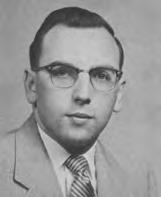

After graduating from Reed, Richard served in the United States Army as a member of the nutrition team sent to Taiwan to study and improve the diet of troops. Returning to academia, he earned his PhD in physiological chemistry from UCLA. Richard loved learning and discovery, and taught, researched, and
published in the biochemical sciences around the world, including at the University of Amsterdam, University of Arizona, Cornell University, Konstanz University (Germany), National Yang Ming University (Taiwan), Shanghai Institute of Biochemistry and Cell Biology, and the University of London. He taught biochemistry/biophysics at the John A. Burns School of Medicine at the University of Hawaii.
Richard’s passion for scientific discovery was matched by his passion for history, and his expansive library spanned history from ancient Roman and Etruscan civilizations to the founding of the United States. He served in numerous service organizations, including the American Heart Association, the Knights of Columbus, and the Lions Club.

He spoke fondly of the community at Reed and the intellectual rigor of the curriculum, which encouraged his daughter, Cynthia, to attend. After retiring from the University of Hawaii, he and his wife, Stella, moved back to the Portland metro area and supported Reed, attending events and lectures. Stella survives him, as do his daughters Amber, Cynthia Muir ’80, and Olivia; his sister, Rosalee; and his brother, Ronald.
Jerry E. Whalen ’54
December 18, 2020, in Issaquah, Washington, in his sleep. Growing up in the Great Depression in Portland, Jerry graduated from Grant High School and entered the U.S. Army Air Corps, where he served in the Pacific during the end of World War II. After returning to the States, he began at Reed, and during his first year met Alice Parkis on a blind date. During their courtship, he was called back into service in Korea. They were married in 1951 upon his return. Jerry finished his degree in physics, writing his thesis, “An Observation of Charge Carriers in Silver Chloride Crystals at Room Temperature,” advised by Prof. Frederick Brown [physics 1951–55].
When he was hired by Bell Labs, he and Alice moved to New Jersey with their first baby in tow. While at Bell Labs, Jerry earned a master’s degree in physics from NYU. After five years in New Jersey, he accepted a job as an engineer at Boeing, and the family, which had now grown to three girls, moved to Seattle. He was quickly promoted to supervisor and worked on the Minuteman missile project with the U.S. Department of Defense for the majority of his nearly 30 years at Boeing.
When Jerry retired, he and Alice moved to Warrenton, Oregon, achieving their lifelong dream of living at the beach. After 12 years, they moved back to Washington to be closer to their children and grandchildren. Wherever they lived, the pair were involved in church,
35 MARCH 2023 Reed Magazine
In Memoriam
golf, bridge, and community groups. Jerry was a natural leader, known for his punctuality and his ability to organize and make things happen, always with a smile and a willingness to lend a hand. He loved to sing. Music was a part of his family life, and he sang in barbershop quartets, in church choirs, and in the Rusty Chords at Timber Ridge, the retirement home he lived in.
Alice died a few months prior to Jerry, who is survived by his three daughters, Carol Hibbard, Diana Taylor, and Julie Churchill.
Alexandra Arnold Lynch ’56
October 6, 2022, in Portland.
Alexandra attended St. Helen’s Hall in Portland, followed by Brimmer and May School in Massachusetts. Returning to Portland to attend Reed, she married noted Portland artist Douglas Lynch in 1955. They made their home in Northwest Portland and had two sons, John and Jason.
In the ’80s, Doug and Alix opened the Design Source on the fifth floor of the Galleria in downtown Portland. Doug’s studio was in the back of the space, and Alix operated an import boutique in the front. With an eye for beauty, she curated the work of artisans from around the world in a boutique featuring delicate Mexican straw Christmas ornaments, exquisitely woven fabrics from Ethiopia and India, colorful tapestries from Peru, and jewelry from nearly every country on the globe. To step inside was to enter a treasured world of art and beauty.
Preceded in death by Douglas, her husband of 54 years, and her son Jason, she is survived by her son John.
Glen Howard Wilcox ’56
November 30, 2019, in Portland, Oregon.
Glen was born in Heppner, Oregon, the youngest of three brothers and two sisters. When he was in the second grade, the family moved to Hermiston, Oregon, where he excelled in high school sports and served as student body president his senior year.
After he graduated in 1945, most of his friends were drafted into the army to fight in World War II. Glen wanted to join the navy, but he was only 17. He talked his mother into signing for him to join the U. S. Navy Air Corps, which had a program called the “Kiddie Cruise” that allowed men to sign up at age 17 and serve a three-year enlistment instead of
four. Glen finished boot camp in San Diego just after the United States dropped the bomb on Hiroshima. Many sailors who had been fighting were shipped back to the States, and the newly enlisted sailors were sent to sea to replace them. Glen was disappointed to discover he wasn’t going to sea. Instead, having discovered that Glen excelled at teaching, the navy sent him to Jacksonville, Florida, to teach electronics at a new school they had established.
After being discharged from the navy, Glen entered the University of Florida, intent on following his passion for education. He married his first wife, Gwen, and welcomed his daughter, Cynthia, into the world. When he and Gwen divorced, Glen moved back to Oregon and began working in his brother’s machine shop. He intended to enroll at Oregon State University until friends told him about Reed. He came into Reed as a junior, and the following summer lived in the boiler building, in charge of maintenance and the summer recreation program, which included the swimming pool and day camps using the athletic facilities. During his senior year, he was asked to be assistant athletic director when the athletic director quit. Glen accepted the position, knowing it meant it would take two years to finish his senior year.
While lifeguarding, he met a woman named Joan, who had once taught swimming and came to swim in Reed’s pool with friends. Glen asked her out, insisted she learn to play bridge, and coached her brother’s high school basketball team. Joan and Glen married and spent the next 65 years together.
Glen wrote his thesis, “Neutron Radiography,” advised by Prof. William Parker [physics 1948–79]. After graduating, he purchased 40 acres of land on Mt. Scott in Southeast Portland, where he built a gunite swimming pool, intending to operate a summer day camp where he would teach swimming during the summer and then teach public school the rest of the year. Their plans changed and Glen and Joan decided to cover the pool, and provide year-round swim lessons. In addition to the swimming lessons, Play Haven provided such activities as trampoline, archery, hiking, fort building, horseback riding, singing, and sports for the thousands of local children who came to the facility for 26 years.
During the first years of Play Haven, Glen and Joan welcomed the 4Ks to their family: Kim, Kari, Kylie, and Kristi, all of whom eventually became employees and managers.
Glen’s passion for education led him to become a David Douglas School District budget committee member and then a school board member. He spent several years as a teacher’s aide in the classroom and was involved in leading 4-H groups for Kim and Kari in poultry, electronics, and outdoor cooking.
Property taxes, insurance, and operating
expenses caused Glen and Joan to make the difficult decision to close Play Haven and sell the property in 1983, and their journey took a new course. Joan went from teaching swimming to accounting and computer education, and because of his extensive background in math and science, Glen was a natural for the emerging computer world. He played an integral part in helping his son, Kim, get his CPA/accounting business up and running by developing accounting software for the company. Kim’s business, Wilcox & Company, PC, became a success, due in part to Glen’s dedication, and Glen continued working with Kim into his 80s.
Glen loved the outdoors, bridge, pinochle, and gardening. He and Joan moved into a Gresham, Oregon, senior living community in 2018. Glen is survived by his wife, Joan; son, Kim Wilcox; and daughters, Kari Rohr, Kylie Holstrom, and Kristi Wilcox Wilson.
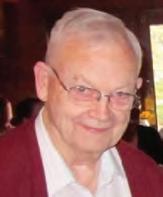
Johanna Anderson Ghei ’57
October 23, 2022, in Madison, Wisconsin, at home.
Johanna grew up in the Cannon Valley of rural Minnesota, near the bluffs of the Mississippi River. Her brother and cousins were her companions and she went to Red Wing public schools, participated in 4-H, and developed skills as a baker and seamstress.
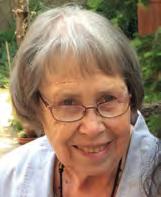
Her mother was appointed ambassador to Denmark, and the family moved to Copenhagen, where Johanna became fluent in the language, attained her diploma at Aurehøj Gymnasium, and made lifelong friends.

Johanna studied at Reed and then the University of Minnesota, where she completed both a BA and an MA in psychology. During her studies in Minnesota, she met and married Som Ghei, a psychologist from India pursuing a PhD with a Fulbright Scholarship. They lived in New Delhi with his family, and she taught mathematics and science at the American School. Returning to the U.S., they lived in Vermont and New Hampshire, and then settled with their children in Oshkosh, Wisconsin.
Johanna developed a long and varied career in the field of psychology, first specializing in child psychology, including working to establish the effectiveness of the Head Start program and evaluating mental health in children and adolescents. She later expanded her involvement in the field, completing her PhD at the University of Wisconsin with a study of Karen Horney’s concept of the real self. As a licensed psychologist, Johanna focused in the areas of grief and loss, women’s self-esteem, and trauma. She established a private practice working with her colleague and close friend, Bonnie Gunnon.
36 Reed Magazine MARCH 2023
Johanna achieved her goal of placing the family’s rural Red Wing land into the protection of the Minnesota Land Trust for conservation of the land in perpetuity. She was a devoted cinema fan, a perennial flower gardener, an avid bird watcher, and a longtime member of Wisconsin Public Radio.
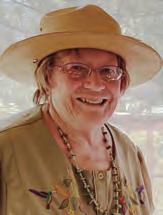
She is survived by her children, Kiren, Raman, and Gita Ghei ’88, and grandchildren, including Rajni Schulz ’23
Timothy E. Rice ’57
September 14, 2022, in Manlius, New York, after a short illness.
At Reed, Timothy wrote his thesis, “The Changing Pattern of Soviet Foreign Economic Policy,” advised by Prof. Carl Stevens [economics 1954–90]. He went on to receive a master’s degree in economics from Yale University. Settling in Syracuse, New York, with his wife, Susan, he worked as a consultant in development economics and became a fixture in the local political scene as an outspoken advocate for social and civil rights. Timothy served 24 years as the 18th District Onondaga County legislator, during which time he held respected positions as majority and minority leaders of the Democratic legislative party. He loved serving his constituents in the Syracuse University area and, up until his death, was heavily involved with the Thornden Park Association. He enjoyed grant writing for multiple projects and organizations, including the Syracuse Housing Division.
Predeceased by his first wife, Susan Rice ’57, and his second wife, Joanne Kaplan, Timothy is survived by his children from his first marriage, Ethan Rice, Jason Rice, Aaron Rice, Jessica Rice, and Malaika Rice, and his stepchildren from his second marriage, Craig Kaplan, Cheryle Kaplan, and Wendy Kaplan-Emmons.
Donald (Donangelo)
Robert Schuman ’57
October 19, 2022, in Bend, Oregon.
Born Donangelo Schuman in Chicago, Illinois, Don spent his childhood in Williamstown, Massachusetts, where his father was a political science professor.
After being admitted at Reed, he drove from Massachusetts and arrived on campus with 56 cents in his pocket and a half tank of gas. “The only reason I got here at all is that I had a hitchhiker I’d picked up so I could buy another tank of gas,” he recalled. He needed some cash, and the Reed maintenance crew hired him that first week, giving him enough money on which to live.
Don wrote his thesis, “An Epistemological Enquiry into Whitehead’s The Concept of Nature,” advised by Profs. Edwin Garlan [philosophy
1946–73] and David French [anthropology and linguistics 1947–88], graduating with degrees in philosophy and anthropology.
After teaching for a while, he left the field. But his brother’s death in 1962 shocked Don into wanting to do something meaningful. Three years later, he received a master’s in teaching from Portland State University and returned to education, teaching English and media studies at Sunset High School in Beaverton, Oregon.

Don’s brother introduced him to books on raja, hatha, and bhakti yoga when he was in his teens, setting him on a spiritual course. In the ’70s, he discovered Guru Maharaji, who inspired him to meditate extensively and helped him begin his “path of love.” Don wrote six novels girded by his spiritual philosophy and was a passionate environmentalist.
His first wife was Bette Brown (now Bette Rice), who survives him, as do their three children, Dieter Stargard, Karl Schuman, and Allison Suran.
Patricia Yeager Washburn ’58
September 18, 2022, in Northglenn, Colorado. Though she was born in California, Pat was proud of her family’s connections to Colorado. Her mother, Eleanor, was the daughter of Ethel and Joe Mills, who built and ran the historic Crags Lodge in Estes Park. Her father, Dorr, was one of Rocky Mountain National Park’s first rangers. They instilled their daughter with a love of nature, which Pat passed on to her children and thousands of visitors who came to Rocky Mountain National Park, where she served as an enthusiastic part-time docent at the Rocky Mountain Conservancy into her late 70s.
She studied at Reed College, where she met her first husband, Arthur Washburn ’57. Pat finished her bachelor’s degree at Colorado College and received an MA in religion from Iliff School of Theology. She became an adjunct faculty member in the justice and peace studies program at Iliff and said, “I credit Reed with ‘radicalizing’ me to have a heart for the marginalized, and leading me to be a peace educator.”
In the ’70s, Pat was the director of religious education, both at St. Thomas Episcopal Church in Denver and later at Denver’s First Unitarian Church. She cofounded the Shalom Community, a residential support community in Denver, which continues to this day as the Karis Community. In her later years, she served as a lay pastoral associate at St. Bartholomew’s Episcopal Church in Estes Park, and as chaplain at Good Samaritan Retirement Village in Estes Park. She served on the board of the Estes Park Museum and was awarded its Pioneer Award in
2018 for her passionate efforts to keep Estes Park history alive.
Pat worked for the National Peace Academy Campaign in Washington, D.C., and developed and taught a conflict resolution and peace studies program at Earlham School of Religion. She developed peace, conflict resolution, and social justice materials for the Episcopal Church and the American Friends Service Committee, and traveled the world to work with other peacemakers. Her work for peace was not just theoretical. In 1990, she wrote the Department of the Treasury to inform them that she would no longer be paying taxes as a form of protest to the size of the military budget. A formal peace tax resister, she testified before Congress in support of a peace tax fund that would allow citizens to designate their taxes to nonmilitary purposes. As a result, the IRS seized her car and attempted to garnish her wages. For the rest of her career, she worked part-time hours to attempt to keep her salary below a taxable level. She was supported by her employers and friends, who helped her find creative ways to continue to live in Estes Park, where she had a wide social circle. With their assistance, she was able to live in and serve her beloved mountain town until the penultimate year of her life.
Pat loved music and singing, and performed in choirs and as a soloist. Married three times (Arthur Washburn, Thomas Washburn, Bryan Michener), she is survived by her sister, Sally; her sons, Christopher and Peter Orbison Washburn ’87; and her daughters, Polly and Coretta.
Gayle Rood Burnett ’59
October 3, 2022, in Portland.
Born in Lincoln, Nebraska, Gayle moved with her family to Portland, where she attended Lincoln High School and Reed. She married K. Philip Horine Jr., and they raised two children, Daniel and Annette. A devout Christian, Gayle was a longtime member of Cedar Mill Bible Church. She loved plants, was certified as a Master Gardener, and was known for her quick wit and infectious laugh. Gayle was preceded in death by her husband, Loy James Burnett, and son, Daniel Horine. She is survived by her daughter, Annette Coyle, and her sister, Peggy Horine.
Judith Michie Sakurai
Yamauchi ’60
July 12, 2022, in Portland.
Judy was born in Portland, the last of six children of Chiyoko and Masaru Sakurai. Since her mother was induced one month early so that the doctor could go on vacation, Judy was quite small (5 lb.) and slept most of her first year. When she was three years old, she and her family were sent to the Portland Assembly Center (Pacific International Livestock Exposition Pavilion) until the permanent concentration camps could be set up in south central Idaho. She spent ages four to six at the Minidoka Relocation Center in Idaho.
After World War II was over, Judy and her
37 MARCH 2023 Reed Magazine
family moved back to the family farm in Troutdale, Oregon; but, due to prejudicial words and comments indicating that they weren’t welcome there, they decided to leave and sold the land. Judy’s father started work as a landscape gardener and moved into the only place that would accept many Japanese American families in Portland—the Federal Public Housing Administration’s Vanport (the country’s largest public housing project). During the 1948 Vanport flood, the entire housing project was destroyed in less than a day, and more than 18,000 residents were displaced. After her family was flooded out of Vanport, they lived for a while in Fairview, and then in downtown Portland; she attended Lincoln High School.
Following the example of her two brothers, Richard Sakurai ’53 and Edward Sakurai ’58 , Judy came to Reed, where she majored in organic chemistry and wrote her thesis, “The Synthesis of Hippurylglycine using N, N, N¹-Triphenylformanidyl Chloride,” advised by Prof. Marshall Cronyn [chemistry 1952–89]. She went to graduate school at the University of Oregon and was recruited by Shell Development Corporation in Emeryville, California, to work as a chemist in the patent section doing international literature searches because of her language abilities in German and French. Shortly thereafter, she was sent by Shell to go back to graduate school at Stanford University to learn the Japanese language.

Hiroshi Yamauchi (originally from Maui, Hawaii) was living in the San Francisco Bay Area, working for the competing Ortho Chemical Company, when he met and married Judy. After earning his PhD at UC Berkeley, he accepted a position at the University of Hawaii at Manoa, and the couple moved to Hawaii. Hiroshi remained a professor of natural resource conservation economics at UH until his retirement 30 years later.
Hiroshi and Judy had one child, a daughter, Kara Mie, who was born in Honolulu. For a time, Judy was a stay-at-home mom. After her daughter was in school, Judy went to work as the director of the Japan-America Society of Hawaii until the family went to Japan for Hiroshi’s two Fulbright Fellowships, at Kyoto University and at Tokyo University. While in Japan, she worked for Suntory in Akasaka-Mitsuke, Tokyo. After returning to Honolulu, Judy worked for many years at the Japanese consulate as a speechwriter for the consul general. Eventually she and Hiroshi left Hawaii to relocate back to Portland to help their daughter care for their granddaughter, Nicole.
Judy had a lifelong interest in the fine arts, particularly in drawing and lithography, and studied at the Honolulu Academy of Arts, Bishop Museum, and the University of Hawaii. She painted commissioned portraits while she
was in Honolulu, and studied calligraphy for 15 years in Portland under Fujii sensei. She worked to paint and illustrate more than 500 haiku poems written by her late mother that had been published throughout the course of 50 years in the Japanese literary magazine Hototogisu
To keep herself busy during the pandemic, Judy took it upon herself to make and deliver Japanese bentos every Friday to more than 15 shut-ins in five different retirement homes. She enjoyed doing volunteer work and throughout her retirement years was involved in many volunteer projects.
She is survived by her daughter, Kara Mie Williams, and granddaughter, Nicole McGraw.
Thomas Swanson ’62
July 12, 2022, in Portland, from peritonitis. With the exception of two years he spent in the Peace Corps, Tom lived most of his life in Portland, where he was born. At Reed, he wrote his thesis, “Theory of Equations for Polynomials in One Indeterminate,” advised by Prof. Dorothy Christensen [math 1959–65], and the following year received his MAT. He went on to earn a master’s degree in mathematics from the University of Oregon.
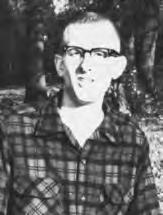
In the Peace Corps, he was sent to West Cameroon, where he worked for the government as a road surveyor. He loved both his time there and the people he met, and was able to travel throughout West Cameroon and to nearby countries. While surveying, he sometimes had to spend the night in a rural village— much different from the house he shared with other Peace Corps volunteers in Kumba. One of the highlights of his stay was a visit to the hospital run by Albert Schweitzer in Gabon.
Tom’s professional life was as a high school teacher in the Portland Public Schools. His first assignment was at Adams High School, a nationally celebrated alternative program, where he met many innovative and dedicated teachers
who influenced the rest of his career. After Adams was closed, Tom taught at Jefferson High School, leaving in 1987 to join the staff at the Grant Night School (GNS), an alternative program for nontraditional students. He worked primarily as a math teacher, but was also given the opportunity to teach other subjects, such as current events, astronomy, origami, and puzzle making. His excitement for the subjects he taught and his love of teaching made Tom a very successful teacher. Able to think outside the box, he reached students who had never succeeded in or enjoyed math.
Twice chosen as the state nominee for the Presidential Award for Excellence in Mathematics Teaching, he won the Excellence in Education award from Portland Public Schools in 1998, and then retired from teaching.
Tom was active in the Oregon Council of Teachers of Mathematics (OCTM), serving on the board of directors both as an area representative and as vice president. He helped organize and was a presenter at many northwest math conferences, coedited the OCTM publication, TOMT, and was recognized with the Oscar Schaaf Secondary Mathematics Education Award. Tom continued his involvement with OCTM until his death.
Tom had a lifelong love for math and puzzles. In his last months he spent hours with his eightyear-old grandson, Miles, working on Rubik’s Cube solutions and math problems. Tom began playing volleyball as a teenager and didn’t stop until his health issues made it impossible to continue. He played on several teams, including the Oregon Rustys, and competed at the National Volleyball Championships for many years. In graduate school, he spent several summers coaching at a girls’ volleyball camp in Canada, and at Adams High School, he coached the girls’ team that won the city championship in 1974 and 1975. Tom was admitted to the Portland Interscholastic League Hall of Fame in 2007, and for many years he also coached the teams on which he played.
In 1978, he married Erica Rubin, and they adopted their daughter, Thea, in 1980. After a cross-country trip following Erica’s retirement, the couple moved to the Oregon coast, living for eight years just outside Cape Lookout State Park near Tillamook. After their grandson was born, they returned to Portland to join the ranks of doting grandparents.
In the ’80s, Tom discovered that he had inherited a kidney disease, which he was able to hold at bay until 2016, when he began dialysis. He continued to travel, play volleyball, and enjoy an active life until he was 80, when he began a series of hospitalizations. Sadly, he caught COVID while in the hospital and spent the last 10 days of his life in isolation. He is survived by his wife, Erica; his daughter, Thea; and his sister, Georgia.
In Memoriam
38 Reed Magazine MARCH 2023
Kaori Hopkins O’Connor
October 4, 2022, at St. John’s Hospice, London, following a brief illness.
’68
CONTRIBUTED BY JOHN CUSHING ’67
A social anthropologist whose writings fused history with archeology, Kaori studied material culture, including the commodities of empire, fashion, and the anthropology of food.
Born in Hawaii, she grew up on Waikiki Beach during the idyllic era before statehood, when the Aloha Spirit still prevailed. Part Japanese, part Hawaiian, part Native American, her ancestors included a New England whaling captain turned island sugar planter and one of Hawaii’s first Japanese immigrant entrepreneurs.
Rather than write an academic essay while applying to Reed, Kaori submitted a poem in which she portrayed herself as a child of the sun, sea, and sand of Hawaii. The admissions committee was sufficiently impressed to offer a spot in the group that enrolled in the fall of 1963.
As a freshman, Kaori plunged eagerly into the freewheeling social scene at Reed and became known for her exotic looks, fashion sense, and exuberant and generous personality. She did her best to avoid the scrutiny of her strict father, an officer in the Honolulu Police Department, whom she once described as an “Irish cop.”
At Reed, she wrote her thesis, “An Essay on the Nyakyusa of Tanganyika,” advised by Professor Gail Kelly [anthropology 1960–2000]. “Being at Reed was the formative experience of my life,” she wrote.
After earning two degrees in social anthropology at St. Anne’s College in Oxford, Kaori realized, “The only thing I had to look forward to was doing fieldwork up the Sepik in New Guinea where there were no fashion shops and no plumbing.” Instead, she entered and won a talent contest at London Vogue magazine and went to work for the magazine, wandering around the fashion jungle with a notebook, studying the anthropology of fashion, and writing five guides to style and shopping in London. She wrote a number of books on fashion, including the bestselling Creative Dressing
But she came to the decision that there was more to life than style and fashion, and took a job as the editorial director of Kegal Paul International, a London-based publishing company specializing in academic books on Africa, Asia, the Middle East, and the Pacific. Kaori was responsible for an acclaimed series, Pacific Basin Books, reflecting the cultural complexities of the Pacific in the 19th and early 20th centuries.
Eventually she returned to the academy and received a PhD in anthropology from University
College in London. Her dissertation on Lycra won doctoral and postdoctoral fellowships.
She worked as a freelance journalist and broadcaster in television and radio and was a frequent guest on radio and television programs, including Creative Knitting , The Great British Bake Off, and The Great British Sewing Bee. Kaori won the Sophie Coe Prize for food history for her study on the Hawaiian luau. She organized a conference that was the first to look at children’s clothing in the modern period, and was awarded a Pasold Prize for Textile History for her study of the Ladybird children’s dressing gown in the context of the post–World War II baby boom. That paper exemplified a key anthropological principle—that social forms are mirrored in material culture.
Perhaps her most prized accomplishment was the birth of her daughter, Kira Eva Tokiko Kalihiokekaiokanaloa Fion, born in 1991 to Kaori and Peter Hopkins.
Kaori’s books included Lycra: How a Fiber Shaped America (2011), Pineapple: A Global History (2013), The Never-Ending Feast: The Archaeology and Anthropology of Feasting (2015), and Seaweed: A Global History (2017).
“I can’t imagine life without Reed,” she wrote. “I wish I could do it all again, and the only thing more significant was the birth of my daughter. As the years have gone by, Reed has drawn closer rather than receded, and I miss everyone like mad.”
Myron Seth Yorra ’67 recalled, “Kaori and I met on our first day at Reed and talked through the night about British mysticism. We remained friends for the next 59 years. When I was in London, Kaori became my social director. Whether it was her suggestion of lunch at the Ivy to negotiate German rights for the musical Rent, or a wonderful Chinese restaurant across from my hotel to charm a reticent author, London kept no secrets from Kaori, whose facile navigation of the city’s possibilities repeatedly rescued me from desolation. I treasured our friendship.”
Birck Cox ’67 remembered, “I liked her, either because of or in spite of her brash exterior, I’m not sure which. Talking to her, I remember, was sort of like trying to carry on a conversation with Bette Midler, in that her side of it was not always informative, but it was always entertaining.”
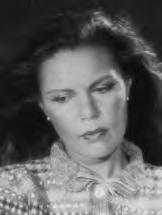
“Kaori’s gentle clarity and courteous obedience to cultural norms blew me away,” said Martha Holden ’67. “She was a gentlewoman, a revelation of how a contemporary could be. Such a gift to a craggy New Englander.”
Although Kaori adapted to the damp cold of England over the decades—as well as to the mordant wit and reserve of the British—she held her love for Hawaii deep in her heart. She was expanding her treatise on the Hawaiian luau into a book when she died. Kaori is survived by her daughter, Kira Eva Hopkins.
Thomas McIntyre ’73
November 3, 2022, in Sheridan, Wyoming, of natural causes.
Renowned as one of America’s great outdoor writers, Thomas was born in Downey, California, and educated by the Jesuits at Loyola High School. Wildly curious and well read, Tom came to Reed. Few things on this mortal coil failed to interest him.
As a writer, he focused on hunting and the outdoors. At age 19, he made his first trip to Africa and developed a lifelong affection for the continent, returning numerous times. He visited every continent in the world with the exception of Antarctica, writing story after story. HIs stories numbered in the hundreds, gracing the pages of nearly every outdoor magazine imaginable, including Field and Stream , Sports Afield , Petersen’s Hunting , Outdoor Life , Bugle, Garden and Gun, and The Field. He was a contributing editor for both Sports Afield and Field and Stream. Sporting News and Carl Zeiss Optics awarded him prizes for his work.
Tom also wrote prolifically for the screen, creating 750 episodes of outdoor television programs for Orion Entertainment, including Buccaneers and Bones, narrated by Tom Brokaw, and the documentary Wyoming: Predators, Prey, and People for the Wyoming Fish and Game Department. He was probably best known for his books, including Days Afield, The Way of the Hunter, Dreaming the Lion, Seasons and Days, and Augusts in Africa. In 2012, he published his only work of fiction, The Snow Leopard’s Tale, which critics hailed as a minor masterpiece. Shortly before his death, he completed what he considered his magnum opus, Thunder without Rain, a history of the cape buffalo. Five years in the making, it is scheduled for publication in February of 2023.
Possessing both a wicked sense of humor and a generous heart, Tom was more than merely an “outdoor writer.” He possessed knowledge on an astounding range of subjects, able to wax on the vagaries of African big game rifles and then delve into interpretations of a passage from James Joyce’s Ulysses. He had an encyclopedic knowledge of film and relished a dry martini (no olives, please) and good food. In his travels, he sampled unorthodox fare, including musk ox bile in Greenland. He is survived by his wife, Elaine; son, Bryan; and brother, Robert.

39 MARCH 2023 Reed Magazine
In Memoriam

Gregory G. Maskarinec ’74
June 16, 2022, in Honolulu, Hawaii, from cancer.
Honor Award by the Nepal literary organization Nepal Sahitya in recognition of his lifetime commitment to Nepali language and literature. His scholarly work in Nepal led to many invitations, collaborations, and extended visits with colleagues at the Centre national de la recherche scientifique in Paris, where all his recordings of shamanic recitals are archived.
Having proved to be a constant antagonist to his teachers, Gregory graduated from high school in Idaho Falls on the condition that he not attend classes. In 1969, he began at Reed, where he met many an intellectual match and made lifelong friends, including Prof. Joe Roberts [math 1952–2014]. Gregory fondly recalled drinking the products of Roberts’s home brewery.
Gregory took a year off from Reed to study the art of hand lettering at Trinity College, Dublin. Copying from the Book of Kells , he calligraphed Joe Robert’s 375-page textbook Elementary Number Theory as well as his own thesis. He enjoyed running the Reed film club with showings in the chapel, evenings of dumpster diving, working summers in National Forest Service watchtowers, and trips to the Oregon coast. He wrote his thesis, “A Categorical Topiary,” advised by Prof. John Leadley [math 1956–93], and from Reed he took with him a profound love for poetry, correct punctuation, and a well-drawn line.
At the urging of other Reedies, who awakened in him a fascination for Nepal, he joined the Peace Corps after graduation. He spent seven years there, first teaching mathematics to high school students in the extremely rural and destitute district of Jajarkot in western Nepal, and then collecting oral shamanic texts as part of a burgeoning ethnographic interest in traditional cultures that he witnessed disappearing throughout the ’70s and ’80s. These collected texts became the material both for his PhD at the University of Hawaii in anthropology, which was published as his first book, The Rulings of the Night: An Ethnography of Nepalese Shaman Oral Texts (University of Wisconsin Press, 1995), and for two volumes of transcripts with meticulous, rhythmic translations: Nepalese Shaman Oral Texts I (Harvard University Press, 1999) and
Nepalese Shaman Oral Texts II: Texts of the Bhuji Valley (Harvard University Press, 2009). On the recommendation of the Nepal Royal Academy, Gregory’s work on Nepal was honored with the Birendra Pragyalankar by the late king of Nepal, Birendra Bir Bikram Shah Dev, and with a Vidhyadhari, an honorary degree of Sanskritic scholarship, awarded by the late Yogi Naraharinath. In 2016, Gregory was given the National
Later in life, Gregory became a professor of medicine in the Department of Family Medicine and Community Health and the Department of Native Hawaiian Health and, in 2018, director of Global Health and International Medicine at the John A. Burns Medical School of the University of Hawaii. There he was known for his unfailing insistence that health care is a human right, a truth he believed should be at the heart of all medical training. In these years, his research interests expanded to questions of culture and health among native Hawaiians and the population of the Micronesian islands, especially the Marshall Islands, Chuuk, Yap, and Palau, while he also continued his work in Nepal. The love of travel that had initially taken him to Nepal persisted until the very end of his life, taking him throughout the Pacific, Europe, and Asia.

Gregory is remembered by colleagues, students, friends, and family for his extraordinary mind, his capacious reading habits, his generous mentoring, his dedication to social justice in Nepal and in Hawaii, and his everpresent wit and joy. He is survived by his wife, Gertraud Maskarinec, and daughters Malika Maskarinec ’05 and Maya, his sister Karen Maskarinec ’74 , and nephew Luke Gabriel Jilka Maskarinec ’18
Herbert Grose ’74
September 13, 2022, in Portland, Oregon, from complications associated with myotonic dystrophy.
Herbert was born in Boston, Massachusetts, and after attending Stoneham High moved to Bremerton, Washington, where he earned an associate in arts degree from Olympic College. He then enrolled at Multnomah University, where he met and married Louise Nash. Herb earned degrees from Multnomah University and Warner Pacific College, and an MA from Reed.
He taught for Portland Public Schools from 1969 to 1998, mainly at Jefferson High School. His passion was gardening each summer in the lot adjacent to their Northeast Portland home. He is survived by his wife, Louise; son, Michael; and daughter, Michelle Williams.
Robert Allen Wayne ’76
November 28, 2021, in New York City, of pancreatic cancer.
CONTRIBUTED BY TOM RHOADS ’75
Robert was born in Chicago, Illinois, to Leonard Wayne, a decorated World War II combat aviator and CFO/executive for Holiday Inn and other hotels, and Marilyn Wayne, a housewife and greeter in the hospitality industry. At a very early
age, Robert showed academic promise and a gift for problem solving, puzzles, and navigation. He received his high school diploma from Chicago’s Loyola Academy and became a National Merit Scholar. He excelled academically, including at languages, algebra, calculus, and physics, but when it came time to declare a major at Reed, he chose theatre with a minor in economics, to the great consternation of his early advisor, Prof. Frederic Rothchild [music 1953–78], and his disappointed father.
Robert flourished at Reed. He immersed himself in the arts, took piano lessons with Fred, studied dance with Prof. Judith Massee [1968–98], and relished the many roles he took on in Reed theatrical productions, often alongside Loraine Shields ’74, and in On the Verge, a play written by Eric Overmyer ’73. Initially unsure of himself and ungainly, Robert transformed himself from a nerd to a prince; he came out, fell in love, and formed many lifelong friendships, including with Loraine Shields, Cathy Altman ’78, Rube Warren ’75, Robert Cormier ’75, Rahoul Contractor, Tom Rhoads ’75, Judy Levitow ’74, and Cecilia Roque ’75 He wrote his thesis, “The Process of Directing Musset’s The Candlestick ,” advised by Prof. Larry Oliver [theatre 1972–77].
The financial support Robert received from home wavered—perhaps as a reaction to his major—and he took on part-time jobs while attending Reed, most notably at Harry and Mary Okamoto’s fruit stand on Holgate, where he stocked shelves. During the summers, he worked as a night auditor at various Holiday Inns in San Francisco, Honolulu, and Boston. Working the odd jobs, it took him an extra year to graduate from Reed. He then moved to New York City, where he lived with his Reed friend Cathy Altman until he took occupancy of a rent-stabilized apartment on Bank Street. That became his home for 44 years, with the exception of the four years he lived in Palm Springs, California.
Buoyed by his love of theatre and success at Reed, Robert began auditioning for roles, studied with Stella Adler, acted in several soap operas, and was a body double for actor Gary Oldman. He supported himself by working in nightclubs, catering, doing odd jobs, as a switchboard operator at the Middletown Hotel, and as a waiter at several upscale French restaurants. It was a heady time
40 Reed Magazine MARCH 2023
Robert and Roxie at the Frey II House in Palm Springs
and there was a great sense of freedom. Robert fell in love again, this time with Scott Sherman, with whom he lived for a while and spent summers on Fire Island. He traveled to France and immersed himself in the culture there.
The AIDS epidemic had yet to fully emerge, but by the mid to late-’80s there were signs that gay men were beginning to mysteriously get sick and die. Robert Cormier, who had been Robert’s lover at Reed and had moved to New York a year before Robert, became sick and hung on for several years, during which time Robert attended to him and his roommate, Jerry. Robert Cormier died in November 1989.
Finding sustained success in the New York City theatre world proved difficult, and it was with dawning recognition that Robert decided to switch gears. He applied to the Yale School of Management, specializing in the arts. His long-dormant financial/quantitative skills were reawakened, and Robert moved to New Haven during the week to attend classes. Much older than his fellow classmates, Robert nonetheless excelled in the program, and he graduated in 1993 with a master’s in private and public management. His immersion in the arts at Reed along with his master’s degree from Yale allowed him to marry his love for art and culture with an innate talent for quantitative problem-solving—paving the way for a succession of increasingly more responsible financial/ management jobs in the nonprofit arts arena.
He worked as company manager for the Trisha Brown Dance Company right out of Yale, and then ascended to the role of chief financial officer at various institutions, including the New York Theatre Workshop, the College Art Association, and the Palm Springs Art Museum; he was CFO and COO at the Astoria Museum of the Moving Image. Robert found time to get another master’s degree, one in nonprofit accounting from Baruch College, where he graduated at the top of his class; and while in Palm Springs he completed his CPA license, passing all four tests on his first try.
During the four-year period that Robert worked for the Palm Springs Art Museum, he was given the use of the Frey House II, a modernist masterpiece owned by the museum. And, nearby, his good friend Barbara Howard, from New York Theatre Workshop days, owned Casablanca, built by her father Jack Warner, where Robert and his father, along with Robert’s beloved dog, Roxie, were frequent visitors. By this time, Robert and his father had long since reconciled. Leonard was living in Las Vegas, and he took great pride in Robert’s many accomplishments.
Robert’s gamble of getting a management degree at Yale later in life had given him another avenue for working in the arts, this time behind the scenes but always in the company of creative people. Just as he had established strong bonds with the board and artistic staff at the New York Theatre Workshop, Robert likewise made himself
invaluable in Palm Springs while spending quality time with his aging father.
A kind, self-effacing, and compassionate friend, Robert wore his incredible intellect lightly. He was easy to be with—shyness masked a giddy affability and innate kindness— and he sympathized with the plight of those in crisis or who were less fortunate. His love knew no bounds for his beloved dogs, Lucy and Roxie.
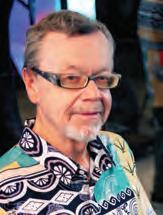
When Leonard passed away in 2012 at the age of 92, Robert vowed to return to New York. He worked brief stints at the Astoria Museum of the Moving Image in Queens and at MoMA/ PS1, but in 2016 decided to retire and enjoy his life. He took on a number of volunteer assignments: with God’s Love We Deliver and Alcoholics Anonymous (AA), he traveled widely and helped support and care for his aging mother, who passed away at the age of 98 in September 2020. He took classes at Tibet House and Menla and began meditating.
One of the joys of his retirement years was his involvement with the Yale alumni association in New York City, where he joined a class on religion and enrolled in an ongoing poetrywriting workshop. Though he only very briefly had time to find his voice before getting very sick, Robert penned this poem near the end of his life:
Fire Island Pines
It’s cooler here than in the city. The breeze blows more freely
Tracked by swaying branches and rainbow flags on poles.
A sandbar
To the south is the ocean, to the north the bay
Different kinds of water
One crashing and ebbing and flowing
The other lapping.
For all its non-cityness, the population is rather dense.
Birds’ melodies eclipsed by 70’s disco music and raucous chatter.
One can always take a walk. The world expands very quickly
On the boardwalk to the beach
The horizon, shimmering and vast – eternity!
Oops, interrupted by glistening, prancing, posing bodies.
Each with its own cadence
Seemingly unself-conscious, but definitely self-aware
I pass unnoticed and walk on towards the sun on the sea.
Constance Eleanor Austin ’77
October 17, 2022, in Dover, Massachusetts, from complications related to Parkinson’s disease.
Connie was born in Alabama, where her father was stationed in the army. The family moved to Weston, Massachusetts, and then to Brookline, where Connie attended Heath Elementary School and Winsor School.
From an early age Connie was drawn to other cultures. At 13, she traveled by herself to Greece to spend the summer with the family of a friend. In her junior year of high school, she lived and studied in Chamonix, France, with hosts who spoke no English. After high school, she attended Reed for two years before moving to Europe, first to France, where she traveled with friends, and then to Florence, Italy, where she studied language and art history. She returned to the States, where she got a bachelor’s degree in Renaissance literature and studies at Wellesley College.
After six months of law school, Connie was sure she didn’t want to write contracts and resolve disputes for the rest of her life. Instead, she went to work in the medical field, eventually as the coroner at Beth Israel Hospital in Boston for a number of years.
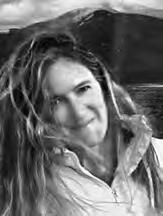
Later in life, she started and managed a highly successful catering business, which allowed her more opportunities to travel extensively. She was a gifted athlete, excelling at any sport she tried, read constantly in four languages, delighted in exploring ideas with others, and was always ready to discuss big topics, ranging from the scientific to the metaphysical. She rode horses and motorcycles, painted and sculpted, and adored animals. Connie is survived by her husband, Peter Mercer, and four brothers, James Austin Jr., Harry Austin, Bayard Austin, and Bryan Austin.
Niall Lynch ’80
August 2021, in Palm Desert, California.
Born in Oslo, Norway, where his father had a position with the U.S. Air Force, Niall was raised in Fairbanks, Alaska, 100 miles south of the Arctic Circle. At Reed, he wrote his thesis, “Cognitive Dissonance Theory and Apocalyptic Literature: Passion, Intrigue and the Lust for Explanation,” advised by Prof. Dennis McCann [religion 1976–80].
Niall received a master’s degree in ancient Near Eastern literature and languages from the University of Chicago, which, as he said, led
41 MARCH 2023 Reed Magazine
directly to a career in software development, beginning as a quality assurance lead in 1985. While he knew nothing about the discipline at the time, neither did anyone else. Largely selftaught, he worked in the fields of file conversion, natural language processing, statistics, cybersecurity, fraud analysis for the mortgage industry, artificial intelligence/data science, fintech, and software quality assurance.
After 20 years in Chicago and 18 in Los Angeles, Niall moved to Palm Desert, where he worked as a consultant. He spoke many languages, including Russian and German; loved literature, especially Russian literature; and wrote short stories he hoped to have published.
“I didn’t know him at Reed,” Bruce Weiss ’80 said, “but he was the life of the party among his Facebook friends.”
Niall is survived by his brother, Sean Lynch, and his sister, Leslie Lynch.
Brian Nicholson ’85
February 23, 2022, in Missoula, Montana, from pancreatic cancer.
CONTRIBUTED BY SCOTT M. YOUNGSTEDT ’85
Brian was born in Fort Meade, Maryland, in 1963, and lived abroad for eight of his first 11 years in Lagos, Nigeria; Bogota, Colombia; and Rio de Janeiro, Brazil. He returned to the U.S. with his parents and three siblings and graduated from Walt Whitman High School in Bethesda, Maryland, in 1981. Brian majored in economics at Reed, where his thesis, “Interregional Disparity in Brazil,” was advised by Prof. George Hay [economics 1956–83].
Brian lived with his sweetheart, Anne Mattocks, during his last two years at Reed. They married in Rockville, Maryland, in the summer of 1985. Not long after, they served as Peace Corps volunteers in Tunisia, where they learned Arabic and taught beekeeping to rural farmers. After the Peace Corps, Brian and Anne settled in Rockville, where they lovingly reared three children who have become wonderful adults. Brian made a living in Maryland with his own house-painting business. In recent years, his work increasingly included construction and remodeling projects—he knew how to build a house from the ground up. Brian earned a master’s degree in education from Johns Hopkins University, but decided that he enjoyed the freedom of owning his own business too much to pursue teaching.
I met him during the first meeting of our Hum 110 course and later that day in the sports center, and we instantly became very
close friends. That never changed. There was just something about Brian. Our mutual friend, Steve Halpern ’85, fondly reminisced, “Brian lived across the hall from me as dorm mates, so I met him from day one. He seemed more focused, thoughtful, and aware of the things that mattered than most of us.” I share Steve’s perspective. Brian and I spent the fall break of our freshman year backpacking in the Cascades, which involved grueling hikes and flagging down a Greyhound bus on a mountain highway. His remarkable social skills can be attributed to his parents and his early years in West Africa and South America. Brian was comfortable with all sorts of people, regardless of ethnicity, age, wealth, or education. He made people happy. When he entered a room, a party ensued. And he made people think. Throughout his life, Brian read widely in politics, economics, and history. He was always ready for debate, and he knew how to disabuse friendly rivals of their ill-conceived positions.
Brian loved hiking and backpacking in the Rocky Mountains. Most summers he traveled west to Placid Lake, Montana, to share good times and a love for the outdoors with family and friends at his family’s cabin. His work kept him lean and fit. In recent years, we enjoyed several backpacking trips into wilderness areas in Wyoming and Montana, and Brian seemed as strong and agile as the day we met. He also enjoyed relaxing on beaches of the East Coast, the Caribbean, and Hawaii.
Brian had to cancel our backpacking trip in the summer of 2020 after he was diagnosed with pancreatic cancer. I visited him four times after that for a total of six weeks, and I will always cherish those times. He remained hopeful and fought hard with incredible dignity and grace. After a surgery in the spring of 2021 that was deemed successful, Brian decided to permanently relocate to Missoula, Montana. He had been thinking about this for years, especially because his parents were there, and all of his children and grandchildren moved there in recent years. Shortly after his arrival in Missoula, the cancer returned and rapidly metastasized. However, Brian retained his sense of humor and love of life. We managed two last car camping trips and shared more laughter and political debate.
Brian died in his parents’ home while comforted by family. He was one of a kind and lived a good life on his own terms. He is survived by his wife, Anne; his mother, Colleen Nicholson; his children, Aubry, Aaron, and Nick; and his siblings, Sean, Bruce, and Shelley.
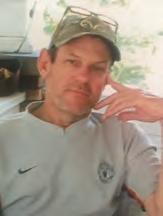
Sarah Pliner ’94
October 4, 2022, in Portland, in a bicycle collision. Sarah moved from New York City to attend Reed, but dropped out and began working in restaurants. She landed a job in the kitchen of the Heathman Hotel—her first big opportunity in

the world of fine dining—and then moved on to Giorgio’s. Returning to New York, she began making a name for herself at Michelin-starred restaurants like Aquavit and Aldea. One person Sarah had worked with was Jasper Shen. They reconnected after a period of time and discovered that they were both ready to leave New York. Forming a triumvirate with Shen’s wife, pastry chef Kat Whitehead, they moved to Portland and opened Aviary in 2011. Sarah described the new restaurant’s cuisine as modern French technique with global flavors. The restaurant was housed in a building that burned down five months after Aviary opened, having been set afire by stray Fourth of July fireworks. It reopened 10 months later on Northeast Alberta Street and was named Restaurant of the Year by Willamette Week, putting Sarah on the map. People swooned over such dishes as foie gras bao, crispy pig ears, and cardamom pudding. A review in Conde Nast Traveler deemed Aviary’s food “inventive,” and said, “You’ll enjoy cocktails on the patio and a meal that’ll quietly knock your socks off.”
A server at Aviary, Lauren Hill, was gobsmacked at the innovative and beautiful creations Sarah turned out in the kitchen, with ingredients like monkfish, duck tongue, and chicken skins. “I never worked somewhere where I’d seen so many people cry, you know— tear up because the dish tasted so good.”
Suzy Hoke, a family friend, had avoided eating fungi her entire life. But Sarah insisted she sample them in a dish she created with hen of the woods mushrooms. “I tried to back out of trying them, but she was persistent to the point that I took the tiniest bite and prepared to wash it down with a large glass of water. It was one of the most delicious things I’ve ever tasted.”
Aviary closed in 2020 during the pandemic. Sarah became the chef at Fullerton Wines, creating seasonal, bimonthly pairing dinners at their wine bar in northwest Portland, cooking at the Greek-inspired Bluto’s on Southeast Belmont Street, and planning to open her own new restaurant. She was bicycling to work at Bluto’s when she was hit by a truck near the intersection of Southeast 26th Avenue and Powell Boulevard. Sarah is survived by her mother, Susan; father, Elliot; stepmother, Judy; and older sister, Jessica.
In Memoriam
42 Reed Magazine MARCH 2023
Jeremy Thomas Stone ’99
September 24, 2022, in Vancouver, British Columbia, took his own life as a consequence of long-term depression.
Jeremy grew up in the small coastal town of Angleton, Texas, the son of a preacher and a stayat-home mom. The family lived on the margins of the poverty line; Jeremy’s father was often between jobs, and his mother was mentally ill and could not work. This experience formed his lifelong dedication to social justice, working with marginalized communities, and his passionate work in community economic development.
In high school, Jeremy distinguished himself on the speech and debate team, and counted himself a member of almost every social circle at school. When he was 15, his parents passed away, and Jeremy became a ward of the State of Texas. When he graduated, he was voted “most likely to live very, very far away.”
He earned a bachelor’s degree in anthropology at Reed, where he wrote his thesis, “The Fall of the Cassowary: Ethnicity, Morality, and Anthropological Understanding in West New Britain,” advised by Prof. Gail Kelly ’55 [anthropology 1960–2000]. He was a student senator for two terms, started an organization that held raves on campus, played rugby, scrounged at commons, and proudly lived at the Red Door.
“After Reed, I used my social science degree to get a job in the dot-com boom,” Jeremy said. “Realizing that I hated corporate life, I dropped out and started working at a nonprofit helping small entrepreneurs. This led to volunteering with the Peace Corps in Mongolia, underwriting microfinance loans in New York, and leading small business recovery with commercial fishermen in Louisiana after Hurricane Katrina.”
As a Peace Corps volunteer in Mongolia, he developed a love for travel and mountain landscapes. Jeremy saved up $10,000 by working the box office at a Frank Sinatra tribute theatre in Chicago and then traveled overland for six months, from Istanbul, through the Middle East, Central Asia, all the “Stans,” and eventually to China. He then completed a master’s degree in public administration from the Wagner School at New York University.
While working as a senior financial analyst with the nonprofit organization Seedco Financial (now TruFund), he came to New Orleans for two years after Hurricane Katrina; his work there included designing and managing small business recovery programs. He comanaged a $20 million grant and loan program following the hurricane, and developed the Southeast Louisiana Fisheries Assistance Center, a firstof-its-kind initiative that provides ongoing financial and technical assistance to commercial fishers.
Jeremy worked and volunteered with many Vancouver organizations, including Ecotrust Canada, EMBERS, LOCO BC, the City of Vancouver, and Building Opportunities with Business. He was the director of the community
economic development program at Simon Fraser University and taught at the University of British Columbia and Tulane University.
Jeremy loved traveling to small towns in British Columbia to work with locals and develop economic recovery initiatives. He started a consultancy firm, Recovery and Relief Services, Inc., which worked with local governments to prepare and respond to economic shocks following disasters. Every year he returned to New Orleans to work with his friends in the Vietnamese fishing community.
Jeremy was a founding board member for the nonprofit Coastal Communities Consulting, which aids in recovery efforts following disasters such as the BP oil spill. His most recent employment was with the B.C. provincial government department of emergency management.

In June of 2022, with the help of a Vanier Scholarship, he reached his lifelong goal of earning a PhD in community and regional planning from the University of British Columbia. His dissertation, which examined gentrification in the Central City neighborhood of postKatrina New Orleans, won the H. Peter Oberlander prize for the year’s best thesis.
He was a loving father who crafted and created everything from sewing projects to filming short movies with his daughter, Ellie. A feminist, and a voice for social justice, he often took her to protests for Black Lives Matter, Indigenous and women’s rights, and climate change. An advocate for rural and small businesses, Jeremy understood that the culture of a place was heavily dependent on the local businesses that support a community. A Texas native, he was a fan of BBQ and made the best ribs and brisket north of the border.
Asked what advice he would give Reedies, Jeremy replied, “Don’t worry about linear trajectories. The first or second job you take out of Reed doesn’t set your career path, so don’t put a lot of pressure on yourself to do the right thing. Look for interesting experiences, or employers who care about mentorship. You’ll have to get an advanced degree at some point, so use that as your career reset. In the meantime, just learn about the world outside of academia and enjoy your life.”
Jeremy worked hard to overcome his childhood trauma, addiction, and poverty to be
a voice for change and goodness. He leaves behind his daughter, Ellie, and his loving coparent, Anne Pearson ’99
Prof. David DeSante [biology 1975–77]
October 18, 2022, while hiking near Rodeo Lagoon in Marin County, California, from an apparent heart attack. A beloved Reed professor of ecology in the ’70s, Prof. David DeSante founded the Institute for Bird Populations (IBP) in Petaluma, California. He earned his PhD from Stanford University and held assistant professorships at Stanford and Reed, where he was a young assistant professor of biology. Having been one of the pioneers of modern birding in California, he introduced many of the concepts to young Oregon birders and started a Reed College birding club of enthusiastic Reedies. “He inspired many a bird-watcher in our classes,” said C. Mirth Walker ’79. One of DeSante’s legacies is the “Winter Bird Species Likely to be Found in the Reed College, Crystal Springs Garden and Canyon Area” on the Reed website. In the early ’80s, he returned to California to serve as a biologist at the Point Reyes Bird Observatory.
Founding IBP in 1989, David was its executive director until 2008. The nonprofit corporation studies the causes of bird population decline, and collaborates with individuals, government agencies, and NGOs to assess the effects of land management actions, climate change, and other ecological stressors on bird populations and prescribe practical solutions.
His research interests included population dynamics, winter ecology, biogeography, and migration and navigation. He published more than 80 peer-reviewed papers, monographs, and books, and more than 160 technical reports. He won numerous national conservation awards, including the Partners in Flight Investigator’s Award, Conservationist of the Year from the Western Chapter of the Wildlife Society, the Chandler Robbins Conservation and Education Award from the American Birding Association, and the Lifetime Achievement Award from Partners in Flight.
He died suddenly of an apparent heart attack while hiking near Rodeo Lagoon in Marin County to view a willow warbler that had recently been found.
PENDING OBITUARIES
Rae Galbraith Ballard ’48, Fred Matthies ’49, Katherine Kolesoff Averill ’50, S. James Averill ’51, Allen Davenport Bragdon ’52, Dale W. Jorgenson ’55, John W. Thompson ’55, Jeremy Caughlan ’56, Vivian Tomlinson Williams ’59, Irene Janofsky Hartzell ’60, Charles Pollack ’61, Margaret Strawn Mesirow ’62 MAT ’64, Ron Becker ’64, Charles Frederick (Fred) Rogers ’66, Robert Dietsche ’69, George A. Galati ’70, Neil Talbot Jumonville ’77, Genevieve Head ’83, Anahita Ariana ’93, Rob Fishel ’03
43 MARCH 2023 Reed Magazine
Object of Study
What we’re looking at in class
Photographing the Zenana: Gender and Representation
Breaching long-established norms of propriety and representation, Maharaja Ram Singh II—ruler of the princely state of Jaipur (1835–1881)—took an unprecedented series of photographic portraits of women who practiced the custom of purdah (seclusion) and lived in the zenana (a section of the palace reserved exclusively for women). This photograph of an unidentified woman of the zenana emphasizes her self-assured demeanor, with her arm resting casually yet firmly on a table and eyes gazing directly into the camera lens. In portraying the women of the zenana as dignified and confident, Ram Singh’s photographs challenge British colonial perceptions of the zenana as a dark, dangerous, and unsanitary place, where women were ostensibly oppressed by Hindu patriarchal society. The timing of Ram Singh’s portraits coincides with increasing social reforms for women in British India, including the colonial government’s ban of sati (the immolation of widows) in the early 19th century. While banning sati undoubtedly saved lives, it also helped to justify British imperialism by emphasizing the need to, as literary theorist Gayatri Spivak describes, “save brown women from brown men.” Such social reforms were rarely about the well-being of women; rather, women were merely the ideological battleground on which debates around tradition and modernity were played out. Do Ram Singh’s photographs then serve to challenge Orientalist imaginaries of non-Western cultures? Or, are they a staging of modernity that serves to uphold a traditional value system? These are some of the questions around photography and representation that we discussed in art 305: The Camera in South Asia. —PROF. SHIVANI SUD [ART]

Reed Magazine MARCH 2023 44
These trees which he plants, and under whose shade he shall never sit, he loves them for themselves, and for the sake of his children and his children’s children, who are to sit beneath the shadow of their spreading boughs.
SECURE YOUR FUTURE AND REED’S
Support a transformative education for future generations of Reedies. With a charitable gift annuity, you can receive a dependable cash flow for life—regardless of market fluctuations.
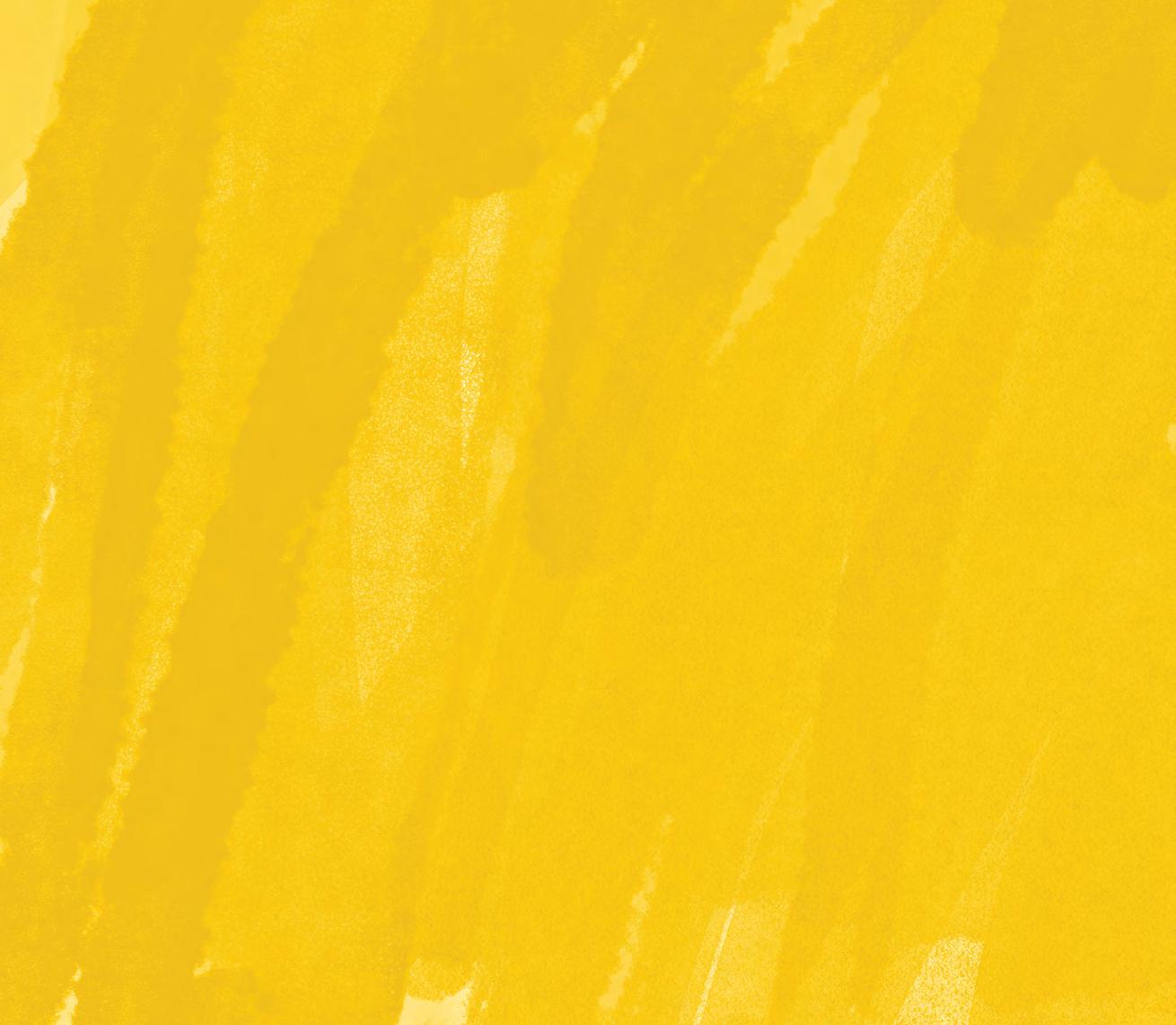
When you establish a charitable gift annuity at Reed, you can
• receive fixed payments for life;
• earn a charitable income tax deduction;
• reduce recognition of capital gains taxes by donating stock;
• support Reed’s future.
SANTI ALSTON 503-517-7937 ALSTONS@REED.EDU Contact the office of gift planning to receive a custom gift calculation and to confirm we offer annuities in your state.
HYACINTHE LOYSON 1866
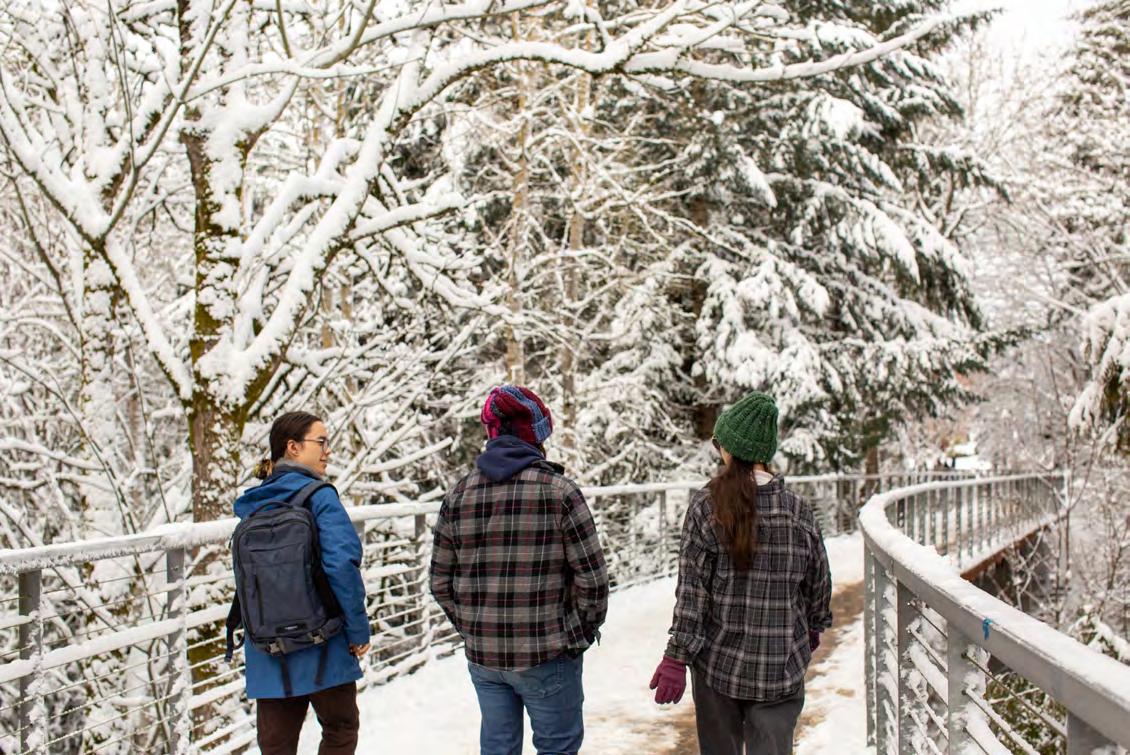
COLLEGE
SE Woodstock Boulevard Portland,
Periodicals Postage Paid Portland, Oregon
REED
3203
Oregon 97202 -8199
cornelia soma penn ’24
In February Portland experienced its second snowiest day on record, with 10.8 inches blanketing the city and transforming campus into a wintry wonderland.




 BY REBECCA JACOBSON
BY REBECCA JACOBSON
 BY ROMEL HERNANDEZ
BY ROMEL HERNANDEZ



 PHOTO BY LAUREN LABARRE
PHOTO BY LAUREN LABARRE










 BY REBECCA JACOBSON
BY REBECCA JACOBSON

 BY ROMEL HERNANDEZ
BY ROMEL HERNANDEZ

























 These Class Notes reflect information we received by December 15. The Class Notes deadline for the next issue is March 15.
teeter
These Class Notes reflect information we received by December 15. The Class Notes deadline for the next issue is March 15.
teeter


 Eduardo
Dr. Catherine Collier Kisska ’68 relaxes at her ranch. Photo by Ruth Lindauer Sherman ’67, MAT ’68.
Peter Langston ’68, group leader of Lucasfilm’s design group, as seen in the San Jose Mercury News, May 9, 1984.
Eduardo
Dr. Catherine Collier Kisska ’68 relaxes at her ranch. Photo by Ruth Lindauer Sherman ’67, MAT ’68.
Peter Langston ’68, group leader of Lucasfilm’s design group, as seen in the San Jose Mercury News, May 9, 1984.












































